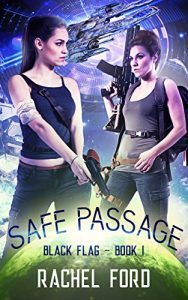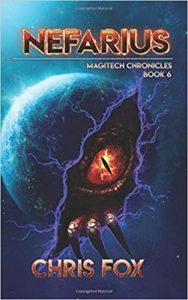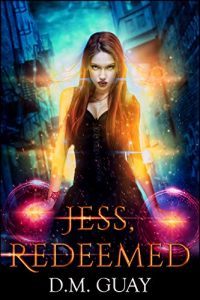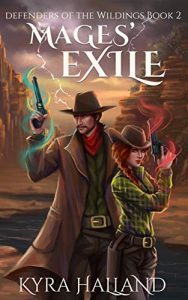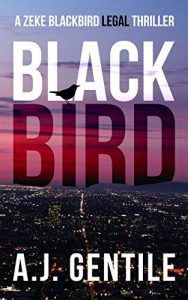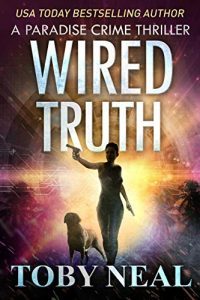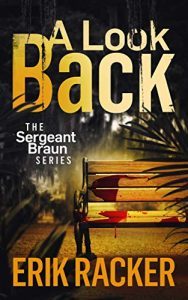Cora Buhlert's Blog, page 71
May 18, 2019
Two new Thurvok stories available: The Bleak Heath and The Cave of the Dragon
Yes, this is another new release announcement. But first, I also have a promo to announce. Cause Dave of Double-Cross Lit is running another of his two-genre promos. This time around, the theme is “Questions & Answers” and the genres are science fiction and mystery. You can get thirteen e-books, two of them mine, all for 99 cents. For a list of all participating books, visit the Double-Cross Lit website.
And now for the new release announcement. It’s another double announcement for the last two stories in the Thurvok sword and sorcery series to date. Both stories have actually been out since late April, but certain stores were dragging their feet getting the books up, so I’m officially announcing them only now.
The Bleak Heath, the first of the two new (well, sort of) Thurvok stories, starts where the previous story The Forest of the Hanged left off, with Thurvok, Meldom and Sharenna on the run after saving Meldom’s childhood sweetheart Lysha from the gallows. Their flight takes them to the titular Bleak Heath, where they find even more danger. And this time around, Sharenna and Lysha get to rescue Thurvok and Meldom.
The Bleak Heath is the longest Thurvok story to date and the only one which was not written during the 2018 July short story challenge. Instead, The Bleak Heath was inspired by a hiking daytrip to the Lüneburger Heide, a heath landscape that is a popular hiking and holiday destination in North Germany. I usually visit the Lüneburg Heath once a year in late August or September, when the heath is in bloom. You can see some photos of previous visits here, here and here. The Lüneburg Heath can be rather bleak at the best of times, but last year, it was even bleaker than usual due to the extremely hot and dry summer of 2018. It is also a landscape that has inspired many writers and artists, most famously Hermann Löns. I had always planned to write a story set on the Lüneburg Heath one day. And then last year, as I was hiking across the heath, Thurvok and his friends were still very much on my mind – after all, the July short story challenge had ended only a few weeks before. And so I thought, “Why don’t I send Thurvok and his companions trudging across the heath?”
So prepare to follow Thurvok, Meldom, Sharenna and Lysha, as they dare to cross…
The Bleak Heath
[image error]Thurvok the sellsword and his companions Meldom, thief and occasional assassin, and the sorceress Sharenna are fleeing across the Bleak Heath after saving Meldom’s childhood sweetheart Lysha from the gallows. Weary and exhausted, they are relieved to come upon a hut on the heath. But what they find inside that hut may well be more dangerous than the heath itself.
This is a novelette of 10500 words or approx.. 35 print pages in the Thurvok sword and sorcery series, but may be read as a standalone. Includes an introduction and afterword.
More information.
Length: 10500 words
List price: 0.99 USD, EUR or GBP
Buy it at Amazon US, Amazon UK, Amazon Germany, Amazon France, Amazon Netherlands, Amazon Spain, Amazon Italy, Amazon Canada, Amazon Australia, Amazon Brazil, Amazon Japan, Amazon India, Amazon Mexico, Kobo, Barnes & Noble, Apple iTunes, Google Play, Scribd, Smashwords, Playster, Thalia, Weltbild, Hugendubel, Buecher.de, DriveThruFiction, Casa del Libro, e-Sentral, 24symbols and XinXii.
The second new Thurvok story, The Cave of the Dragon, is the chronologically last (at least for now), but it was actually written before The Bleak Heath, during the 2018 July short story challenge, where the aim was to write a short story per day in July 2018.
Like many other July short story challenge stories, The Cave of the Dragon was inspired by a piece of fantasy art, namely this one. And yes, I know what you’re thinking. “But there is no dragon in the picture.” And indeed there isn’t (which I had completely forgotten about, until I looked up the picture again to make a link). But as I was writing the story, I obviously decided that it worked better with a dragon than with an evil wizard.
The banter at the inn is almost unchanged from the original draft, by the way, which shows that by this point I had gotten to know Thurvok and his friends very well. And yes, in the space of a week or so, the Thurvok stories shifted from a solo adventurer a la Conan via a pair of adventurers a la Fafhrd and Gray Mouser to an ensemble cast. I actually like them better this way, though in retrospect I maybe should have come up with a different series name.
So follow Thurvok, Meldom, Sharenna and Lysha as they venture into…
The Cave of the Dragon
[image error]Thurvok, the sellsword, is enjoying a meal with his friends, Meldom, thief, cutpurse and occasional assassin, the sorceress Sharenna and Lysha, Meldom’s sweetheart whom the adventurers saved from the gallows, when a peasant woman asks them for help. Her young daughter Tali has been chosen to be sacrificed to the dragon that terrorises the area.
Thurvok and his friends want to help her and save Tali. But slaying a dragon is difficult, not to mention dangerous.
This is a short story of 4500 words or 18 print pages in the Thurvok sword and sorcery series, but may be read as a standalone. Includes an introduction and afterword.
More information.
Length: 4500 words
List price: 0.99 USD, EUR or GBP
Buy it at Amazon US, Amazon UK, Amazon Germany, Amazon France, Amazon Netherlands, Amazon Spain, Amazon Italy, Amazon Canada, Amazon Australia, Amazon Brazil, Amazon Japan, Amazon India, Amazon Mexico, Kobo, Barnes & Noble, Apple iTunes, Google Play, Scribd, Smashwords, Playster, Thalia, Weltbild, Hugendubel, Buecher.de, DriveThruFiction, Casa del Libro, e-Sentral, 24symbols and XinXii.
Will there be more Thurvok stories in the future? I’m pretty sure there will be, because I enjoy those characters and like telling their stories. As for Richard Blakemore, he is a pulp fiction writer and used to writing whatever is in demand. Though for the moment, he’s busy fighting crime and penning new Silencer adventures. He’s also considering moving into science fiction, because it’s getting popular, especially with that new editor over at Astounding Stories, and Richard is always eager to try something new.
As for me, next up is Honourable Enemies, a new In Love and War space opera novel, as well as a new adventure for Two-Fisted Todd Donovan. And then, who knows?
 Send to Kindle
Send to Kindle
May 16, 2019
The Problem about “The Bells” and Game of Thrones That No One Talks About
A lot of people are angry about “The Bells”, the penultimate episode of Game of Thrones, mostly with regard to the development of the character of Daenerys Targaryen.
Warning: Spoilers behind the cut!
So Daenerys, Jon Snow and their respective armies are besieging King’s Landing. The city has already surrendered and the bells are tolling, when Daenerys suddenly says, “Burn them all” and proceeds to do just that, riding her lone remaining dragon. In true Game of Thrones style, the resulting slaughter is shown in great and exhaustive detail. The reasons given for Daenerys suddenly deciding to roast a city full of civilians are that she is (understandably) furious after losing two of her beloved dragons, many of her troops and her friend and adviser Missandei, who gets beheaded on Cersei’s orders in what is clearly one of the more problematic and senseless deaths in Game of Thrones and that’s saying a lot. Besides, some people are fond of pointing out, the Targaryens have a disposition to mental illness due to inbreeding. Roughly fifty percent of them go insane (“The Gods flip a coin”) and since Jon Snow, since revealed to be actually a Targaryen, is not insane (so far), it was Daenerys’ turn. Never mind that Daenerys’ brother, killed halfway through season 1, was also insane (so it’s two thirds of Targaryens), the idea of a hereditary mental illness turning people into murderous psychopaths is actually bloody offensive, since the overwhelming majority of mentally ill people and the overwhelming majority of people resulting from incestous relationships are not murderous psychopaths.
Now I have to admit that I gave up on Game of Thrones halfway through season 4, because I simply had enough of all the gratuitous slaughter and death. And with all the likeable characters about whom I gave a damn either dead or in the process of turning into monsters themselves, I didn’t see the point in continuing. In fact, part of what made me give up on Game of Thrones was Daenerys having one hundred and twenty people or so crucified, because she was furious at that slaveholder city which used crucified people as signposts. At the time, I recall little comment about that, but now people are suddenly digging up that long ago event and others like it (because Daenerys has killed a shitload of people) to point out that Danaerys was always destined to become the mad queen. And yes, I agree that Daenerys is a horrible person, but then Jon Snow, Westeros’ golden boy, isn’t much better. In fact, the other thing that made me stop watching Game of Thrones was Jon Snow killing a Night Watch brother played by Burn Gorman. Okay, so that Night Watch brother was a horrible person himself (it’s Westeros, land of the murderous psychopaths), but I’m a huge fan of Burn Gorman, a vastly underrated actor whose inevitable fate it seems to be to get killed in genre films and TV shows. In fact, I’m still amazed that his character actually survives Pacific Rim. Besides, that character wasn’t the only person Jon Snow killed. Some time ago I came across an “all the deaths in Game of Thrones” compilation video (which I can’t seem to find right now, because YouTube is full of Game of Thrones death videos) and realised that Jon Snow had killed a shitload of people as well, a lot more than I remembered, including presiding over the hanging of a teenaged boy. So in short, both Jon Snow and Daenerys Targaryen are horrible people (as is nearly everybody else in Game of Thrones) and neither will make a good ruler. But since it’s extremely unlikely that Game of Thrones will end with Tyrion and Varys introducing democracy (never mind that Varys is apparently dead), it was clear that Westeros would end up with Jon Snow and/or Daenerys Targaryen on the throne (I actually assumed it would be both). And then the whole crap will start again in a couple of years.
But while I’m no longer actively watching, I do follow the recaps and watch the occasional video out of an idle interest in how this story will end. Nonetheless, I don’t really have a dog in this fight, since I suspect Westeros is screwed either way. I saw a clip of Missandei’s execution, noting that it was remarkably restrained by Game of Thrones standards. No blood, no severed head, instead just the horrified reactions of Grayworm – yes, Game of Thrones, you don’t have to show every atrocity in exhaustive detail. Then today, someone posted a link to a video of the scorching of King’s Landing accompanied by Metallica’s “For Whom the Bell Tolls” in the comments at File 770. So I clicked and watched and found myself unexpectedly angry. Not at Daenerys, Cersei, Jon, Grayworm, Tyrion, Arya or any of the other characters on screen or even at the slaughter of fictional people in a fictional city itself. No, as I watched the video I kept thinking, “Oh my God, how could they shoot those scenes in that place? How insensitive can you get? And how come that no one is outraged?”
Now King’s Landing is fictional, but the scenes set there are shot in a very real place, the city of Dubrovnik in Croatia. Croatia in general and Dubrovnik in particular have long been popular filming locations for European films and TV shows – the Karl May movies of the 1960s were shot in Croatia as was the German children’s TV show Die Rote Zora und Ihre Bande (Red Zora and her Gang) – but Hollywood didn’t discover Croatia and Dubrovnik until fairly recently. And the reason for that were the Balkan Wars of the 1990s. Taken together, the Balkan Wars were the deadliest military conflict in Europe after WWII and cost the lives of approx. 130000 people, many of them civilians. And one of the more notable events of the Balkan Wars was the Siege of Dubrovnik, which lasted almost eight months in 1991/1992 and during which the city was repeatedly bombed and shelled. The Siege of Dubrovnik was later eclipsed by other atrocities, but it was a terrible event and headline news, at least in Europe, at the time.
And now a TV show decides to stage the siege and burning of a fictional city in a city which suffered exactly that fate only twenty-seven years ago. Those wounds may have scabbed over, but there still raw. Never mind that most of the extras in those scenes were likely Croatian and that many of them would still have memories of the war and the siege. Worse, several scenes show recognisable buildings in the city being blown to bits and burnt to the ground. Honestly, I don’t even want to imagine how triggering watching “The Bells”, let alone performing in it, will be for someone who survived the Balkan Wars and the siege of Dubrovnik. And unlike a movie about the actual Balkan Wars, people don’t necessarily expect being triggered by Game of Thrones. Of course, they know that parts of the show are shot in Dubrovnik, especially since the city is very recognisable, but they couldn’t necessarily expect to see the city burned in such a gratuitous way.
Of course, Game of Thrones and other Hollywood productions (the Canto Bight scenes of The Last Jedi were also shot in Dubrovnik) bring a lot of money to Dubrovnik and Croatia – both directly via jobs created and indirectly via an increase in tourism, though Croatia and Dubrovnik were already popular tourist destinations before Game of Thrones came along. In fact, Dubrovnik is badly affected by overtourism along with its fellow Adriatic city Venice and has taken measures to reduce it.
I actually was surprised at my anger at seeing Daenerys Targaryen and her troops burning and sacking a city that was recognisable as Dubrovnik, because while I clearly remember the Balkan Wars, I didn’t have any strong connections to what was once Yugoslavia at the time. I do know quite a lot of people who hail from there – students, coworkers, the guy who paved my driveway, the owners of a restaurant I visit regularly. Some of them are the descendants of immigrants who came in the 1960s, but in most cases their families came here as refugees during the Balkan Wars. Most of them never talk about the war, though many are clearly old enough to remember. It was on behalf of those people and many others like them that I was angry. I was angry because the Game of Thrones producers don’t seem to care about the people those scenes hurt.
Furthermore, this is not the first time that Americans have used the Balkan Wars as a picturesque background. There was also the case of Kosoko Jackson’s proposed YA novel A Place for Wolves, which had the brilliant idea to use the Kosovo War as a background for a gay romance between two Americans. That case launched a dozen angsty think pieces about “cancel culture”, whereas I just shook my head and thought, “They’re honestly surprised there was a backlash? Because that book sounds fucking offensive.” And no, I don’t think the book should have been cancelled. Even bad books have a right to exist and there is a minuscle chance that this one is not as bad as it sounds.
But what annoyed me was how many people, inevitably American, completely failed to see why setting a romance featuring two Americans against the backdrop of a bloody war, complete with genocide, that happened barely twenty years ago was hugely problematic. Whereas those same people would be (justifiably) outraged about a romance between two tourists set against the backdrop of the September 11, 2001, attacks.
The Game of Thrones example is not nearly as bad, if only because King’s Landing is a fictional city that just happened to be portrayed by Dubrovnik. Nor was the real Dubrovnik ever besieged by dragons, but the effects of a mortar shell and dragonfire on buildings look much the same on the screen. But both examples show a troubling tendency on the far side of the Atlantic to treat the Balkan Wars as something that happened a long time ago in a place far away and ignore that the wounds are still raw and the pain is real.
In cases like these, the question always is “How soon is to soon?” And there is no one answer to that question, because people are different and react differently. My Dad, who consciously remembers WWII as a kid (born in 1938), nonetheless enjoys watching WWII movies and even news reels. On the other hand my Mom, whose memories of WWII are more fuzzy (born in 1942), steadfastly refuses to watch Captain America: The First Avenger, because WWII is not a cool background for a retro superhero movie for her. And I got angry, when I saw a trailer for a TV movie based on the Gladbeck hostage crisis (most of which, contrary to the name, actually happened in Bremen) and yelled at the screen, “If you must make that movie, can’t you at least show a fucking trigger warning before the trailer, cause there are people who remember.” I realised at the same time that my reaction was not exactly normal and that thirty years between event and movie should be long enough. But I had passed Huckelriede bus station where Hans-Jürgen Rösner, Dieter Degowski and Marion Löblich (she’s often not mentioned these days, but IMO she’s just as culpable) took the No. 53 bus hostage only the day before. I had been on that very bus many times before. My aunt and uncle lived just around the corner from the bus station and when we heard the news, we called them up to make sure they were safe. One of the victims, Silke Bischoff, came from a neighbouring village and had gone to my school. She was friends with the sister of a classmate. One day, I will probably visit the memorial that was been set up for the victims at the bus station two months ago (better late than never), but so far I haven’t. So for me, I guess it will always be too soon with regard to the what has become known as the Gladbeck hostage crisis. And there are many people who were much closer to the events than me.
I’m not sure how to resolve this. But creators should at least be aware that the historical event they’re planning to use either directly as a backdrop to their story (A Place for Wolves, Gladbeck) or that they indirectly and maybe not even consciously reference (Game of Thrones) is someone else’s painful history and open wound.
Comments are closed.
 Send to Kindle
Send to Kindle
May 11, 2019
The Golden Age Was More Diverse Than You Think
I’m currently in the middle of reading the 2019 Hugo finalists, alternating with the 1944 Retro Hugo finalists to avoid overdosing on either contemporary or vintage SFF.
I just finished reading the finalists in the novelette category for the Hugos and Retro Hugo. And while the 2018 novelettes are all fine and worthy stories, there is no real standout among them. And indeed, I’m not the only one who has noticed that the short fiction categories at the Hugos and Nebulas are a tad weak this year with plenty of good stories, but no really outstanding ones. By contrast, the Retro Hugo novelette ballot contains three absolutely stunning stories, all of them deserved classics which have been reprinted dozens of times, one story that’s great, but not quite as great as the top three and two stories which are perfectly fine, but no longer as good as they probably were back in 1943. But in addition to how good the 1943 novelettes are and how well they hold up seventy-six years later, I was also struck by how diverse these stories were and that several of them did not match the stereotype of what a science fiction story from the so-called Golden Age was like at all.
Now we all have an idea of Golden Age science fiction in our heads. Hard science fiction with fairly rigorous science, at least by the standards of the time, the unquestioning belief in science and progress, the unquestioning acceptance of colonialism and imperialism, future histories dominated by great men (and of course, they’re always men), square-jawed space heroes and brilliant scientists, competent characters – white, male and American, of course – using their brains and occasionally, their rayguns, too, to solve problems, women – if present at all – as damsels in distress to be groped by bug-eyed monsters and rescued by the competent man, people of colour and LGBT people absent altogether, aliens as the other to be either fought and destroyed or at best patronised, humanity inevitably triumphant. In short, what has become known as Campbellian science fiction. However, John W. Campbell wasn’t the only editor working during the Golden Age, even if he was the most famous one. And even John W. Campbell didn’t only buy and publish Campbellian science fiction.
Reprint anthologies and collections of older science fiction suffer from survivorship bias. Only the best and/or most famous stories are remembered and reprinted, while the many average or just plain bad stories as well as the occasional hidden gem are forgotten. That’s why projects like Galactic Journey or SF Magazines are so valuable, because they review entire magazines, both the good stories and the bad, the classics and the forgotten, and so offer a more complete picture than the cherry-picked reprint anthologies and collections.
Survivorship bias can be found doubly in the Retro Hugos, because not only do people (and the Retro Hugo nominator base is small compared to the current year Hugos) tend to nominate the famous stories, the ones that endured, they also tend to nominate and vote for writers (and editors and artists) whose names the recognise. This is why unremarkable debut stories by future stars tend to get nominated for the Retro Hugos, while better but lesser known works and authors tend to get overlooked. That’s also why Robert A. Heinlein inevitably gets nominated and wins, even for not very good works (Beyond This Horizon, which won the 1943 Retro Hugo for Best Novel last year, is pretty weak, especially compared to some of the other novels on the ballot, and Waldo is worse than The Unpleasant Profession of Jonathan Hoag, but more famous), because he has the name recognition that other authors lack. I don’t even exclude myself here. When nominating for the Retro Hugos, I first check ISFDB to see what my favourite authors published that year.
But even taking the known problems with the Retro Hugos into consideration, the breadth and variety of stories on the 1944 Retro Hugo ballot is astounding (pun fully intended), as is the fact that quite a few of them don’t really fit into the prevailing image image of what Golden Age science fiction was like. And this doesn’t just apply to left-field finalists such as Das Glasperlenspiel by Hermann Hesse in the novel category or Le Petit Prince by Antoine de Saint-Exupéry and The Magic Bed-Knob by Mary Norton in the novella category, neither of whom I would have expected to make the Hugo ballot in 1944, if only because US science fiction fans wouldn’t have been familiar with them. No, there also is a lot of variety in the stories which originated in US science fiction magazines.
So let’s take a look at the novelette category at the 1944 Retro Hugos. These are the finalists:
“Citadel of Lost Ships” by Leigh Brackett (Planet Stories, March 1943)
“The Halfling” by Leigh Brackett (Astonishing Stories, February 1943)
“Mimsy Were the Borogoves” by Lewis Padgett (C.L. Moore & Henry Kuttner) (Astounding Science-Fiction, February 1943)
“The Proud Robot” by Lewis Padgett (Henry Kuttner) (Astounding Science-Fiction, February 1943)
“Symbiotica” by Eric Frank Russell (Astounding Science-Fiction, October 1943)
“Thieves’ House” by Fritz Leiber Jr. (Unknown Worlds, February 1943)
Okay, so the stories in question are seventy-six years old (plus, a thirty-one year old Fritz Leiber novella that is tangentially mentioned), but nonetheless, here is your spoiler warning:
So let’s recall the stereotype of Golden Age science fiction that I outlined above and check the actual stories against it. Let’s start with the Golden Age preferred hard science fiction with fairly rigorous science, at least for the time. Only one story, Eric Frank Russell’s “Symbiotica”, might have counted as hard science fiction in the 1940s and the science in question is biology rather than physics. Meanwhile, “Citadel of Lost Ships” is unabashed space opera with a surprising undercurrent of social criticism (more on that later). “The Halfling” is a hardboiled crime story in a science fiction setting (and of course, Leigh Brackett did write hardboiled crime fiction both in print and for the screen), which also serves as a reminder that science fiction was no more an isolated genre in 1943 than it is now, but that science fiction was influenced by other genres and that there were crossgenre stories.
“Mimsy Were the Borogroves” is a science fictional take on the portal fantasy genre (with a bit of metafictional commentary included), which in many ways is a companion piece to the 2019 Hugo finalist “A Witch’s Guide to Escape: A Practical Compendium of Portal Fantasies” by Alix E. Harrow, as both are stories about neglected children, whose caregivers (parents and a child psychologist in “Mimsy Were the Borogroves” and a social worker in “A Witch’s Guide to Escape”) cannot give them what they need and who eventually find salvation on the other end of a portal. In fact, the message of “Mimsy Were the Borogroves” is basically, “Parents, pay attention to your children and listen to them”. And so, “Uncle Charles” a.k.a. Charles Lutwidge Dodgson a.k.a. Lewis Carroll is the only useful adult in the story (and an actual mathematician), because he listens to Alice. Meanwhile, the Paradines and child psychologist Rex Holloway don’t listen to Emma and Scott and so lose the children.
“The Proud Robot” is humorous science fiction, part of Henry Kuttner’s Gallegher series. Coincidentally, it’s also a story about media piracy, a subject that’s still as current now as it was in 1943, though the future of media piracy did not in fact play out as envisioned by Henry Kuttner. Indeed, one aspect of the Golden Age that’s often forgotten is that it wasn’t all po-faced serious business science fiction, but that there were also a lot of funny stories. Humor doesn’t always age well, which is why the funny side of the Golden Age is not as well remembered, though funny stories do find their way onto the Retro Hugo ballot on occasion, such as Fredric Brown’s “The Star Mouse”, which was nominated for the 1943 Retro Hugo last year, or “The Roaring Trumpet”, one of the Enchanter stories by L. Sprague de Camp and Fletcher Pratt, which was nominated for the 1941 Retro Hugo. “Victory Unintentional” and “Robot AL-76 Goes Astray”, both by Isaac Asimov, are two other examples of the funny side of the Golden Age, which sadly both missed the Retro Hugo ballot last year, even though they’re better than “Runaround”, which was nominated. On this year’s ballot, “Thieves’ House” has plenty of humor as well, though it’s primarily an adventure story.
The sixth finalist “Thieves’ House”, finally, is not science fiction at all, but fantasy, more specifically sword and sorcery, though that term wouldn’t be coined until 1961, with a generous side order of horror and a dash of humor. It’s also a cracking good story. And indeed, it is quite often forgotten today that fantasy and horror were part of the Golden Age. Of course, Weird Tales predates the Golden Age (and actually predates Amazing Stories and therefore American pulp science fiction as a distinct genre altogether). And while the heyday of Weird Tales was in the 1930s, it did run until 1954 in its original incarnation, i.e. right through the Golden Age. What is more, John W. Campbell himself edited not just Astounding Science Fiction, but also its fantasy-focussed sister magazine Unknown Worlds. Both fantasy magazines are represented on the 1944 Retro Hugo ballot, Unknown with “Thieves’ House” and “Conjure Wife”, both by Fritz Leiber, and Weird Tales with Robert Bloch’s horror story “Yours Truly, Jack the Ripper”. There’s also “The Dream-Quest of the Unknown Kadath” by H.P. Lovecraft (already dead for six years by 1943, but still publishing from beyond the grave) on this year’s Retro Hugo ballot, not actually published in Weird Tales, though it’s very much a Weird Tales type story, as well as “Doorway into Time”, another portal fantasy by C.L. Moore (who was a frequent Weird Tales contributor) from Famous Fantastic Mysteries, which was very much a crossgenre magazine. Fantasy, particularly from the short-lived Unknown, was also well represented on previous years’ Retro Hugo ballots, e.g. “Magic Inc.” and “The Unpleasant Profession of Jonathan Hoag” by Robert A. Heinlein, “The Sunken Land” by Fritz Leiber, “The Compleat Werewolf” by Anthony Boucher, “The Roaring Trumpet” by L. Sprague de Camp and Fletcher Pratt and “Hell is Forever” by Alfred Bester. Together, these stories offer a good overview of what fantasy was like during the Golden Age. There is sword and sorcery (“The Sunken Land” and “Thieves’ House”), there is horror (“Yours Truly, Jack the Ripper”, “Conjure Wife”, “Hell Is Forever”), there is weird fiction (“The Dream-Quest of the Unknown Kadath”), there is proto urban fantasy (“Magic Inc.”, “The Compleat Werewolf” and again “Conjure Wife”).
So what about the competent man (and of course, it’s a man) protagonists of the Golden Age, the heroic scientists and spacemen? Do we find them in these stories? Not really. Fafhrd and Gray Mouser from “Thieves’ House” are definitely highly competent and very good at what they do (“the best thieves and swordsmen in Lankhmar” according to Fritz Leiber), but they’re also habitual criminals existing on the margins of their society. And indeed, every single character in “Thieves’ House” with the exception of the unnamed maid and the unnamed black kitten is a criminal of sorts. Nor are Fafhrd and the Gray Mouser the only outlaw protagonists on the 1944 Retro Hugo novelette ballot. Roy Campbell, the protagonist of “Citadel of Lost Ships”, is also an outlaw. Ironically, he’s also the most noble character on this ballot and the choice he makes at the end of the story is the sort of noble choice you could imagine Humphrey Bogart making in a 1940s movie. “The Halfling” is not just an actual science fiction crime story, all of its characters – the circus owner John “Jade” Greene, the dancers Laura Darrow and Sindi and Laska, the cat person from Callisto – are all carnival folks and therefore marginalised. The inventor Gallegher from “The Proud Robot” is actually a scientist and brilliant inventor, but he’s also far from competent, since he can only invent things when drunk and promptly forgets how they work, once he sobers up. No, the competent man Gallegher is not. The far future scientist from “Mimsy Were the Borogroves” is not particularly competent either. Not only does he fail to notice that the time machine he invented actually works, he also sends educational toys into the past without considering the consequences. And while, Scott, Emma and Alice from the same story are definitely competent, they are also children. The spaceship crew from “Symbiotica”, who gets marooned on a hostile alien world, are closest to traditional Golden Age protagonists, thought they don’t seem particularly competent either, probably because we’ve read and seen so many “hostile alien world” stories by now that the characters from “Symbiotica” seem like hot candidates for the Darwin Award.
So what about the overwhelming whiteness and maleness of the Golden Age? Again, reality is more complex. For two of the stories on the 1944 Retro Hugo novelette ballot are written by a woman (the same woman in this case) and a third is co-written by a woman. Of course, Leigh Brackett and C.L. Moore are the best known women writers of the Golden Age and quite often the only two women writers of science fiction working before the 1960s that people know of at all, though there were other women writing SFF during this period such as Amelia Reynolds Long, Allison V. Harding, Clare Winger Harris, Leslie F. Stone, Mary Elizabeth Counselman, Everil Worrell or Greye La Spina.
Moving from authors to characters, two of the stories feature no female characters at all. But of the four stories that do feature women and girls, none of the female characters match the damsel-in-distress stereotype so often considered te default this era. That said, Laura Darrow from “The Halfling” and Ivlis from “Thieves’ House” do match a stereotype of the era, that of the femme fatale. Imagine Rita Hayworth or Veronica Lake portraying them in a movie and you’ve got the right idea. However, there is more than meets the eye to both Laura and Ivlis and both are characters in their own right rather than voluptuous cardboard cut-outs. Stella Moore from “Citadel of Lost Ships” is not just a love interest, but also a rebel (and a telepath) who fights alongside the male protagonist. And Emma, though only five, is the smarter of the Paradine siblings from “Mimsy Were the Borogroves”, a story which also features another significant female character in young Alice (Liddell). Rounding out the list of female characters in these stories are Sindi, the Martian carnival dancer from “The Halfling”, who gets murdered because she knows too much, and Ivlis’ unnamed (at least in this story) maid, a minor character who gains much more significance as well as a name (though I’ll be damned, if I remember what it is without looking it up) in “The Mouser Goes Below”, a Fafhrd and Gray Mouser story published forty-five years later, where it is revealed Mouser’s tryst with the lady in question resulted in a son. Looking at the rest of the Retro Hugo ballot, we also have the witchy (and backstabbing) faculty wives of Fritz Leiber’s Conjure Wife as well as the kindly elderly witch Miss Price from The Magic Bed-Knob, which coincidentally is another Retro Hugo finalist written by a woman.
All five authors on the 1944 Retro Hugo novelette ballot are white (and as far as I can tell, there is no person of colour on the 1944 Retro Hugo ballot at all). However, three of the six novelettes feature human characters of colour, while two stories have protagonists of colour. The otherwise unremarkable “Symbiotica” by Eric Frank Russell features a multi-species and multi-racial (albeit all-male) spaceship crew, which includes a black doctor. This is quite remarkable, especially considering this story was published in 1943 in Astounding, whose editor John W. Campbell was known to be rather racist and famously refused to publish Samuel R. Delany’s novel Nova in Analog some twenty-five years later, because he claimed that audiences would not be able to relate to a black protagonist.
And while we’re on the subject of John W. Campbell, he also published “Thieves’ House” as well as four other Fafhrd and Gray Mouser stories in Astounding‘s sister mag Unknown Worlds between 1939 and 1943, when Unknown folded, apparently complete missing the fact that the Gray Mouser is not white. He is repeatedly described as brown-skinned in the thirtysomething stories Fritz Leiber wrote about Fafhrd and Gray Mouser in a span of almost fifty years (though I’d have to check if his skin colour is mentioned in the early stories published in Unknown), and in “Adept’s Gambit”, the one Fafhrd and Gray Mouser story set in our world rather than Nehwon, it is mentioned that the real world equivalent of the city Mouser hails from is Tyre in what is now Lebanon. Interestingly, Mouser – a thoroughly likeable and well-rounded character, even if he is a scoundrel – fits some of the stereotypes about Lebanese people, which appeared in Germany in the 1980s, when we got an influx of Lebanese refugees because of the Lebanese civil war. Now I wonder whether those stereotypes are much older than I assumed or whether it’s simply a coincidence.
Finally, Roy Campbell, the protagonist of Leigh Brackett’s story “Citadel of Lost Ships”, is described as dark-skinned in the story, though Planet Stories cover artist Jerome Rozen depicts him as white and blonde and a deadringer for Doc Savage as portrayed by Walter Baumhofer. But then, Stella is not blonde either, but has black hair in the story. Nor do Roy, Stella and Marah the Martian fight green, lizardlike aliens in the story – instead the primary antagonists are human.
Now I knew that Leigh Brackett’s most famous character, Eric John Stark, is a man of colour, even though cover artists have been ignoring that fact for seventy years. Interestingly, the most recent editions by Cirsova Publishing of all companies, are the first to actually portray Eric John Stark as Leigh Brackett described him, namely as a black man. But while I knew about Stark and must have read “Citadel of Lost Ships” at some point, I had completely forgotten that Roy Campbell is a man of colour as well. In fact, “Citadel of Lost Ships” comes across as a prototype for the later Stark stories in many ways.
“Citadel of Lost Ships” – though not the best novelette or even the best Leigh Brackett novelette on the 1944 Retro Hugo ballot – was a huge surprise for me. I remembered very little of the story beyond the fact that I probably read it, since I read everything by Leigh Brackett I could get my hands on. What makes this story remarkable is not just that it features a protagonist of colour, but also that it is very critical of capitalism and imperialism and particularly of the treatment of indigenous people. What galvanises our protagonist Roy Campbell into action is the impending displacement of Kraylen people, because coal and oil have been discovered in the Venusian swamps where the Kraylen live. Campbell, who was taken in and more or less adopted by the Kraylen (much like Eric John Stark would later be adopted by Mercurians), vows to help them and heads to Romany, a wandering space station assembled from various spaceships (the citadel of the title) where all those displaced by the encroaching Terran-Venusian Coalition have found refuge. But even that refuge is threatened.
“Citadel of Lost Ships” couldn’t be further from Campbellian science fiction (and in fact Campbell did not publish it – Malcom Reiss of Planet Stories did). For starters, humans are clearly the bad guys here and the story is very concerned with the treatment of what Roy Campbell calls “the little people”, many of whom are aliens who – in a genre tradition that would last well into modern times – stand in for various marginalised groups in the real world. The plight of the Kraylen is clearly intended to criticise the treatment of Native Americans – and let’s not forget that the Wounded Knee Massacre took place only twenty-five years before Leigh Brackett was born, while the last conflicts between Native Americans and representatives of the (white) authorities happened within Brackett’s lifetime, i.e. those events were still very much within living memory, when “Citadel of Lost Ships” was published. “Romany”, the name of the space station, refers to the Romani people and indeed, Stella explains at one point that the station and its inhabitants are welcomed as traders but otherwise “hated, just as gypsies [Brackett’s word choice, not mine] always are.” And Roy Campbell himself lost the farm which had been in his family for three hundred years to a hydroelectric dam project, which clearly recalls the Tennessee Valley Authority Act of 1933, whose hydroelectric dams displaced (and were still displacing when the story was written) farmers, families and sometimes whole towns in the name of progress. It’s very difficult to find critical voices about the Tennessee Valley Authority even today (the displaced farmers are usually just a footnote), so to find one in 1943 is quite remarkable. So much for the claim from certain quarters that “the Golden Age was unpolitical and all about fun science fiction”. Cause “Citadel of Lost Ships” is very much a story about Social Justice Warriors in the most literal sense of the word and that from Leigh Brackett, an author from whom I wouldn’t have expected progressive politics, considering that her Skaith trilogy from the 1970s has Eric John Stark dealing with evil hippies and an evil alien welfare state.
“Citadel of Lost Ships” is available online here. But now, let’s have a quote from Leigh Brackett via her character Roy Campbell about imperialism and progess:
“They’re building, Stella. When they’re finished they’ll have a big, strong, prosperous empire extending all across the System, and the people who belong to that empire will be happy.
“But before you can build you have to grade and level, destroy the things that get in your way. We’re the things – the tree-stumps and the rocks that grew in the way and can’t be changed.
“They’re building; they’re growing. You can’t stop that. In the end it’ll be a good thing, I suppose. But right now, for us…”
So much for the unquestioning belief in science and progress and the unquestioning acceptance of colonialism.
One must not forget that these stories are seventy-six years old, so of course there are anachronisms such as a swampy, cloud-shrouded Venus and a solar system teeming with life that never existed that way. Characters smoke, spaceships are tin rockets with fins, there are wooden ladders in space and jumping out of an airlock in orbit does not maroon a character in space, but instead sends them falling towards the planet. The gender politics are occasionally problematic and sometimes, there is a term such as the g-word in “Citadel of Lost Ships”, which we would not use today. But nonetheless, these stories are a lot more varied and diverse than one would expect and in some cases, they upend our idea what the so-called “Golden Age” was like.
With the heavy reading involved with Hugo voting (made even heavier by the addition of the Lodestar and the Best Series Hugo), I fully understand that many Hugo voters choose not to vote for the Retro Hugos. But whether you vote for the Retro Hugos or not, many of the stories on the ballot are well worth reading and remembering.
 Send to Kindle
Send to Kindle
May 5, 2019
First Monday Free Fiction: Tea and Treachery
Welcome to the May edition of First Monday Free Fiction. To recap, inspired by Kristine Kathryn Rusch who posts a free short story every week on her blog, I’ll post a free story on every first Monday of the month. It will remain free to read on this blog for one month, then I’ll take it down and post another story.
[image error] And because I talked about the somewhat premature death announcements for Steampunk in yesterday’s post, what better story to post than my one published foray into the Steampunk genre, Tea and Treachery?
So prepare to accompany Lady Violetta Chesterfield, as she employs her intelligence and all the feminine wiles at her disposal to rescue her fiancé Captain Nicholas Blackstone of the airship Renegade from the gallows…
Tea and Treachery
“Your Excellency…” The bespectacled head of his secretary popped into the study, snivelling as always, “…I beg your pardon to disturb you. But you have a visitor. From England.”
“From England? Again?” With a sigh, Count Danilo Ostrowsky returned the silver flask filled with most excellent vodka to a drawer of his desk. “What do they want this time?”
“The same as usual,” the secretary, one Mr. Wurm, replied, “Beg for mercy for the pirate.”
“Send them away then.” Ostrowsky punctuated the order with a dismissive wave of his hand. “The matter is settled. The pirate will be hanged tomorrow at sunrise, together with his comrades.”
Privately, Ostrowsky wondered just why the British were so very interested in the pirate anyway. Whenever a foreigner was sentenced to death here in the Kingdom of Dragomir, you normally had to deal with an overworked consulate clerk, an ambassador at the very most, if the condemned was particularly important or notorious. The pirate, however, had drawn not just the British ambassador to his study, but even an undersecretary from Whitehall. All of which suggested that the man was no mere pirate after all, but a spy. Just as Ostrowsky had suspected from the very beginning.
Oh well, by this time tomorrow, the matter was academic anyway. The pirate and his crew would swing and there was nothing anybody could do about it.
“But Sir…” Wurm’s normally corpse-pallid cheeks had taken on a hint of red, as if an overzealous undertaker had smeared rouge on them. “…the visitor… it’s a lady.”
“A lady?” Now that was a surprise. Ostrowsky hadn’t even known that Whitehall employed ladies. “Is she pretty?”
“Well, Sir, not that I’m an expert in these matters, but… yes, I think one could say that she is quite attractive.”
Ostrowsky sighed. For if there was one weakness apart from fine vodka that he had, it was pretty women. “Well, send her in then.”
***
As Wurm ushered the lady into the study, Ostrowsky saw that for once, Wurm had not exaggerated.
For the lady was indeed very attractive. She was well-proportioned with gentle curves that were clearly a gift of nature rather than a corset, though she was wearing one, of course. Her hair was the colour of ripe chestnuts. Her gown was of cut according to the latest Parisian fashion. The colour was a deep rich violet, edged in black.
Half-mourning. Interesting. Though certainly appropriate, since the man for whose life she’d come to plead would hang tomorrow.
Ostrowsky rose as the lady entered and rounded his desk to greet her. “My lady.”
He took her gloved hand and bent down for a kiss, his lips barely touching the soft leather of her gloves. “I am Count Danilo Danilovich Ostrowsky, prime minister to His Majesty Roderick III of Dragomir. And whom do I have the pleasure of addressing?”
“Lady Violetta Chesterfield,” the lady said. Ostrowsky noticed that she was carrying what looked like a picnic hamper. Goodness, was she trying to bring food to the incarcerated pirates?
“Enchanted.” Ostrowsky kissed the lady’s hand once more for good measure. “Most enchanted, Lady Violetta. I heard that you — ahem — wanted to talk to me about a matter of some importance.”
“Indeed I do,” Lady Violetta replied, “However, I believe that matters of any importance are best discussed over a nice cup of tea. It’s so much more civilised. Wouldn’t you agree, Count Ostrowsky?”
The British and their damned tea. It could be the eve of the apocalypse itself and the Brits would still be sitting there, sipping tea. Still, if Lady Violetta wanted tea, then tea she should have. Even if Ostrowsky himself vastly preferred a good, strong vodka.
So Ostrowsky bowed and said, “Of course, my lady. I shall have Wurm bring us a pot of tea.”
Lady Violetta shook her head. “There is no need for that. For you see, Count Ostrowsky, I am quite particular about how I take my tea…”
Oh, Ostrowsky just bet she was.
“…and I have everything I need right here.”
Unbidden, she set down her hamper on the sideboard in Ostrowsky’s office. She opened it and produced an electric tea kettle, two delicate china cups with matching saucers, a sugar pot, a cream pot, a plate, two lithographed tins, a measuring spoon, two silver tea spoons and a table cloth embroidered with violets.
“You don’t mind, do you?” she asked.
Ostrowsky shook his head. “Not at all.”
So he sat down, leant back and watched Lady Violetta as she opened the smaller of the two lithographed tins and carefully spooned some tea into the electric kettle.
“You don’t mind, if I use your water, do you?” she asked.
Ostrowsky shook his head. “Not at all. Be my guest, madam.”
Lady Violetta filled the kettle with water and set the timer for four minutes. At once, the clockwork mechanism began to tick.
While the tea was brewing, Lady Violetta set the table. First she laid down the table cloth, then she set down the sugar and the cream pot (filled with real cream even rather than milk powder) as well as cups and saucers and silver tea spoons.
“I also took the liberty to bring some biscuits,” she said, “I hope you don’t mind.”
“Not at all,” Ostrowsky assured her.
He watched as she opened the larger of the two lithographed tins, took out some biscuits and arranged them on the plate.
“I wasn’t sure which kind of biscuit you prefer, so I brought shortbread fingers, ginger nuts and spiced tea biscuits. I hope that’s all right.”
“Oh, that’s fine, perfectly fine,” Ostrowsky said, for truth to be told, he had a thing for biscuits, any kind of biscuits. Biscuits and the lovely Lady Violetta, what more could a man want?
The electric kettle chimed, so Lady Violetta switched it off and poured the tea.
“One lump of sugar or two?” she asked.
“Two,” Ostrowsky replied, “I have to confess I have something of a sweet tooth.”
With silver tongs, she placed two lumps of sugar into Ostrowsky’s cup and then one lump into her own. Then she poured a few drops of cream into both cups.
Once the tea had been served, Lady Violetta set down, arranging her bustle.
“See?” She picked up the tea cup and took a sip. “It is so much more civilised to discuss matters of importance over a nice hot cup of tea.”
Ostrowsky picked up his cup and took a sip of his own. The tea tasted… well, it tasted like tea and to be honest, Ostrowsky had always been more of a coffee drinker. Briefly, he wondered whether she’d mind if he added a shot of vodka to his cup. But then, a well-bred English lady like her would probably be scandalised by the very idea.
“So about this matter you wanted to discuss with me…” Ostrowsky began.
“Oh, we will get to that in time,” Lady Violetta said, “But first, do help yourself to a biscuit, Count Ostrowsky.”
Ostrowsky helped himself to a biscuit. The biscuits were infinitely better than the tea, crumbly and buttery with just the right amount of sweetness.
“So, I understand you are here about a prisoner in our custody, Lady Violetta.”
“Indeed I am.” Lady Violetta helped herself to a biscuit. “Nicholas Blackstone, captain of the airship Renegade.”
And here it came.
“Captain Blackstone and his crew were found guilty of espionage, piracy and illegally entering Dragomiran airspace. They were duly tried, found guilty and sentenced to death.”
“I am well aware of that.” Lady Violetta was still holding her tea cup, holding it so tight that her knuckles turned white. Interesting. “However, Captain Blackstone happens to be innocent of any wrongdoing.”
Ostrowsky took another sip of tea. “Our courts came to a different conclusion.”
“In that case…” Lady Violetta took a sip of her own. “…your courts are mistaken.”
“Our courts are independent. I do not have the power…”
“Before I came to Dragomir, I inquired who here would have the power to pardon Captain Blackstone and his crew. Everybody told me that you were the man I needed to talk to.” She set down her tea cup and looked him directly in the eye. “Or were they wrong?”
“Not exactly.” Ostrowsky shifted in his chair. Behind his eyes, he felt the first hint of a headache coming on, so he took another gulp of tea. “As prime minister of Dragomir, I do have the power to pardon condemned prisoners in the name of His Majesty, King Roderick III.”
“Well, then I humbly ask you to exercise that power on behalf of Captain Blackstone and his people,” Lady Violetta said and took another sip of tea.
“And why should I do that, pray tell?” Ostrowsky countered.
“As I said, Captain Blackstone and his crew are innocent.”
“The airship Renegade was captured while illegally in Dragomiran space.”
Lady Violetta took a sip of tea. “A most regrettable accident. Gale-force winds blew the Renegade off course and across the Dragomiran border. And in fact…”
She opened her reticule and took out a sheaf of papers.
“…here I have a sworn statement by Professor Aloysius Weathervane of the Royal Institute of Meteorology regarding the weather conditions on the day the Renegade was captured.”
Lady Violetta handed the sheaf of papers to Ostrowsky, who threw a quick glance at it. There were charts and maps and diagrams, none of which made even the slightest bit of sense to Ostrowsky. The figures seemed to blur in front of his eyes, so Ostrowsky shook his head. Damn those migraines.
He took a sip of tea, draining the cup. “This man Blackstone is a notorious pirate and spy.”
“Correction, Captain Blackstone is a privateer,” Lady Violetta countered, “And in fact…” She opened her reticule again and took out a piece of parchment. “…I here have Captain Blackstone’s official letter of marque from Her Majesty, Queen Victoria, duly signed and sealed.”
She handed the piece of parchment to Ostrowsky. This time, he didn’t even glance at it.
“Pirate or privateer is merely a matter of semantics,” he pointed out, “And I for one do not care whether Captain Blackstone and his crew were preying on Dragomiran airships on behalf of the British Empire or for their own gain. The man is a pirate and here in the Kingdom of Dragomir, piracy is punishable by death.”
“The British Empire also takes a very strict view on piracy,” Lady Violetta said. She noticed that Ostrowsky’s cup was empty. “More tea?”
Ostrowsky nodded, faintly irritated. The headache was getting worse. “Yes, please.”
Lady Violetta poured the tea and continued, “However, as I’ve pointed out, Captain Blackstone is not a pirate nor were he and his crew preying on Dragomiran ships. He was in Dragomiran airspace by pure accident. Therefore, any laws regarding piracy do not apply in this case.”
Ostrowsky was losing patience by now. His headache was getting steadily worse and the air in his study was unpleasantly hot and stuffy. He desperately wanted to loosen his cravat and unbutton his waistcoat, take a generous swig of vodka and lay down on the sofa in his study to doze off and maybe dream of the lovely Lady Violetta with her clothes off and her corset unlaced.
But instead, he was sitting here, exchanging pleasantries, listening to idiotic defences and sipping tea, tepid, lukewarm tea.
“Let’s drop the charade, Lady Violetta,” he said, “Maybe Captain Blackstone and his ship really were in Dragomiran airspace by accident and maybe they were not. However, none of that changes that the man is a pirate and a spy, not to mention extremely dangerous and wanted in half of Europe.”
“Oh, I agree that Captain Blackstone can be a very dangerous man,” Lady Violetta said and took a dainty sip of tea, “However, let me assure you that he poses no danger to the Kingdom of Dragomir, at least not at the moment”
Ostrowsky sighed and took a sip of tea of his own, hoping that would relieve the pounding headache at least a little. It did not.
“And who are you to give that assurance, Lady Violetta? You are not a member of the British government or of the diplomatic corps. Indeed, you are not here in any official capacity at all.”
“I am merely a private citizen concerned about the fate of a man that many consider a hero of the Empire.”
“Why?” Ostrowsky set the cup down with such force that some of the tea spilled onto the saucer. “Why do you care so much about a mere pirate?”
“As I said…”
“Yes, I know. You don’t consider him a pirate and you actually think he’s a hero.”
Now Ostrowsky did reach for his cravat to loosen it, at least a little bit. Damn this woman for trying his patience so much.
“But my question stands. Why? Why do you care so much? And don’t give me any bulls… ahem, nonsense that you’re concerned about a miscarriage of justice or some such bull… ahem, nonsense.”
“All right then.” Lady Violetta delicately balanced her tea cup between her fingers. “I wish to save Captain Nicholas Blackstone, because he happens to be my fiancé.”
Hmm, this was unexpected. The prim and proper Lady Violetta and the rough and uncouth pirate. How on Earth had that happened?
Ostrowsky threw a speculative glance at Lady Violetta. On her left finger, she wore a ring, a fine amethyst ring. An engagement gift from the pirate? Still, ring or not, Ostrowsky could not imagine that Lady Violetta’s family was pleased about such a connection. In fact, he was surprised that they hadn’t taken any steps to prevent it. Unless…
“You’re not with child, are you?”
She didn’t look like it, but corsets hid so many things.
“I do not deign to answer a question of such a personal nature,” Lady Violetta said icily, “All you need to know is that I am engaged to marry Captain Blackstone and that I do not wish to become a widow before I ever was a bride.”
“In that case, Lady Violetta…” Ostrowsky fumbled for his cravat, which was still too damned tight. “…you’d best buy your widow’s weeds, because your pirate will hang tomorrow.”
Lady Violetta raised an eyebrow. “Is that your final word?”
“Damn right, it is.”
“In that case, I’m very sorry, Count Ostrowsky. I had hoped we could settle this matter in a civilised manner, but unfortunately you leave me no choice.”
“Are… are you threatening me?”
“Indeed, I am, Count Ostrowsky.” Lady Violetta shot him a concerned look. “But tell me, Count, are you unwell? Because you do not look well.”
It was a ploy. Feign concern to gain his sympathy. But Ostrowsky wasn’t falling for it.
“Save your concern, Lady Violetta. It’s merely a migraine coming on, like always when the wind blows cold from the East. I need to lie down and therefore, I must really ask you to leave now.”
Lady Violetta, however, made no movement to leave. “Your current discomfort is not due to any migraine,” she said, “And lying down will not make you feel any better.”
By now Ostrowsky was becoming truly and well irritated. “And how, pray tell, can you possibly know that?”
A hint of a smile appeared on Lady Violetta’s perfect lips. “Because I poisoned you.”
“You what?”
“I poisoned you,” Lady Violetta repeated calmly, “The poison is quite lethal, I fear. And since you’re already experiencing the first symptoms, I estimate that…” She pulled an elegant watch from a pocket of her jacket. “…you have perhaps an hour to live. Maybe less.”
Ostrowsky looked at the platter with the biscuits, the half empty tea cup and finally at the smiling Jezebel before him.
“You goddamned little…”
“Oh please, could we dispense with the insults?” Lady Violetta said, “I know you’re upset, but we really don’t have much time and I’d rather settle this matter, before you collapse and drool onto this very fine Persian carpet. So yes, I poisoned you. The poison was in the tea, in case you’re wondering.”
Bitch! That goddamned bitch.
Ostrowsky grabbed the half empty tea cup and hurled it at Lady Violetta who dodged it effortlessly.
“Now that was quite unnecessary,” she remarked, “And useless. After all, you already drank the tea.”
“But you… you drank it, too.”
Lady Violetta nodded. “Indeed, I did. However, before coming here, I took the liberty of taking this.” She reached into her reticule and produced a vial filled with a clear liquid. “It’s an antidote that counters the effects of the poison.”
With all his remaining strength, Ostrowsky jumped up and lunged for her. And once again, Lady Violetta sidestepped him easily, so Ostrowsky crashed into the table instead, sending tea cups, saucers, biscuits and silver spoons flying in all directions.
Lady Violetta sighed. “Now that was really uncalled for. And useless, because the poison is already affecting your coordination.”
She held up the glass vial, which contained the key to Ostrowsky’s salvation.
“Contrary to what you might believe, I’m not a murderess. I have no wish to kill you. But make no mistake, I will, if you do not consent to my demands.”
“What demands?” Ostrowsky asked, though he suspected he already knew.
“You will pardon Captain Blackstone and his crew and order them released at once. In fact…” Lady Violetta reached into her reticule again to produce another piece of parchment. “…I have already prepared a legally binding document to that effect, which you only need to sign and seal with the Grand Seal of Dragomir.”
“I will not…”
“And then there is the matter of the airship Renegade, which has been impounded,” Lady Violetta continued undaunted, “Captain Blackstone is rather fond of his ship and needs her back, therefore you will also order the ship released at once and grant the Renegade and everybody aboard safe conduct to the border. And in fact…”
Lady Violetta reached into her reticule to produce another piece of parchment.
“…I have already prepared a legally binding document to that effect. Now if you would be so kind to sign and seal both documents, preferably while you still have sufficient fine motor control.”
“I will not sign that,” Ostrowsky declared, forcing out the words.
Lady Violetta crooked her head or maybe it was just Ostrowsky’s vision that was no longer quite straight. “So you’d rather die? Interesting.”
“If they find you here with me dead, they’ll arrest you,” Ostrowsky said.
“Perhaps,” Lady Violetta agreed, “But I rather doubt it. The poison cannot be detected and I will simply concoct a sob story about how you suddenly collapsed and died in front of my eyes. You may have noticed that I’m quite skilled as an actress.”
“I’ll call the guards and have you arrested right here for attempted murder. Then you can hang alongside your pirate, Lady Violetta.”
Actually, female criminals were beheaded according to Dragomiran law, because hanging women was considered unseemly. But certainly, an exception could be made in the case of an assassin and archvillainess like Lady Violetta.
“Yes, you could do that. And while I confess that a gallows wedding is not what I’d imagined, I would still gladly share the fate of my beloved. However, you will not have the pleasure to watch us hang on account of being dead, Count Ostrowsky.”
“What if the guards seize the antidote?”
“They won’t.” Lady Violetta held up the glass vial once more. “The moment you call for the guards, I will drop the vial. Should you try to attack me again, I will drop the vial. No matter what you try, you will never be quick enough. And by the way, this…”
A ray of light struck the vial, mocking Ostrowsky.
“…is the only dose of the antidote. If you force me to destroy it, you sign your own death warrant.”
“Our finest scientists will analyse the tea, identify the poison and synthesise an antidote,” Ostrowsky declared.
Lady Violetta nodded. “Yes, eventually they will. But not within the next hour. And one hour…” She glanced at her pocket watch again. “…well, actually closer to fifty-six minutes is all you have. Oh yes, and did I mention that death by this particular poison is extremely painful?” Lady Violetta threw him a pitying glance. “But then I suspect I don’t have to.”
“You bitch! Goddamned, lying, fork-tongued whore!”
Lady Violetta seemed utterly unimpressed by his insults. “So, Count Ostrowsky, are you going to sign the documents now?”
Ostrowsky regarded that accursed woman and asked himself whether the pleasure of knowing that she’d hang was worth his life. Unsurprisingly, the answer was no.
“When I sign the pardons, you will give me the vial?”
“You have my word,” Lady Violetta solemnly, “And while I know that you do not hold a high opinion of me, I am a woman of my word.”
“And you’ll take your pirate and your airship and never come back?”
“I promise you that you will see neither me nor Captain Blackstone nor the Renegade again after today.”
“All right then… I’ll do it.”
Stupid woman. As soon as he had the antidote, Ostrowsky would countermand the pardon and have Lady Violetta arrested. And then he would have the pleasure of watching her hang alongside her pirate after all.
He tried and failed to get up. In the end, Lady Violetta had to support him for the few steps to his desk. She helped him sit down, handed him a fountain pen and watched as he signed the pardons and sealed them with the Grand Seal of Dragomir.
“And now the antidote.”
“Not yet”, Lady Violetta whispered. Or maybe, it was just his hearing that was going. “Call in your secretary, give him the documents and ask him to see to it that they are delivered to the respective authorities at once.”
So Ostrowsky had no choice but to call in Wurm, who promptly slithered into the study and skittered to a halt, once he took in his employer’s appearance.
“Your Excellency, are you unwell?”
It was Lady Violetta who answered. “Count Ostrowsky is merely experiencing a bout of migraine due to the oncoming East wind. And besides…” She winked coquettishly at Wurm. “…the Count recently engaged in some strenuous physical activity, if you know what I mean.”
Wurm swallowed. “I… I see.”
Lady Violetta handed him the two parchments, the signed and sealed parchments that ordered the pirates pardoned and their ship released.
“And now would you be so kind to see to it that these documents are delivered to the respective authorities, so Count Ostrowsky and I can engage in more pleasurable activities.”
Wurm bowed. “Of… of course, madam. Your Excellency.” He took the parchments and left.
“And now the antidote” Ostrowsky croaked as soon as the door had closed behind Wurm.
“Of course.” Lady Violetta handed him the vial. “Like I said, I am a woman of my word.”
With trembling fingers, Ostrowsky pushed the stopper from the vial and downed the clear liquid. He looked up at Lady Violetta or rather at the purple blob that he assumed was Lady Violetta.
“It… it’s not working.”
“Give it a few seconds,” Lady Violetta said, “And now I must take my leave. Thank you for your cooperation, Count Ostrowsky.”
She picked up her reticule and strutted towards the door.
“Oh yes, and I forgot to mention that I took the liberty of mixing a powerful sedative into the antidote. It is quite harmless, I assure you, but I fear it will knock you out…”
Ostrowsky’s head hit the desk with a thud.
“…for the next six hours. Don’t worry, I shall tell Mr. Wurm that you want some privacy.”
***
Less than an hour later, Captain Nicholas Blackstone and his men were rudely dragged from their cells in the dungeons of the Fortress of Ratimir. They were shackled and marched into the courtyard of the fortress.
“What’s going on, Captain?” Blackstone’s first officer Mr. Wheelwright asked, “I thought they weren’t going to hang us until tomorrow.”
Nicholas Blackstone was no wiser and the guards were as uncommunicative as ever. “Maybe they’ve moved up the execution”, he said.
He hated this, hated that his crew would suffer on his behalf. Even though they’d all known what they were letting themselves in for, when they signed up with him.
In the courtyard, the gallows was looming, nooses gently swaying in the easterly wind.
Nicholas faced the gallows squarely, unwilling to look away. And while some of his crew gulped, no one whimpered or broke down. Because the crew of the Renegade were the bravest men and women in the sky. And Nicholas was honoured to have served with them.
The prison governor met them at the foot of the gallows, looking distinctly unhappy. Of course, the man always looked as if he’d swallowed a walking stick and was now suffering from terminal indigestion, but this was worse than usual. You’d think he’d be pleased to finally see Blackstone and his crew hang.
“All right, Blackstone, I don’t know how you pulled this off, since you’re as guilty as any man I’ve ever hanged, but…” The governor nodded at the guards. “…you and your people are free to go.”
On cue, a guardsman stepped forward and unlocked Blackstone’s shackles. All around him, his people were being set free as well.
“So take your damned ship and leave. And I swear to you, should I ever see you again, Blackstone, then I will personally hang you.”
In front of them, the heavy gate of the Fortress of Ratimir opened with a croak of pure frustration. Nicholas Blackstone and his people were truly free.
***
Nicholas Blackstone wasn’t sure what he had expected to find waiting for him outside the fortress, but it certainly wasn’t the sweetest sight his eyes would ever see. For there was his beloved Violetta, clad in a purple dress that set off her figure to perfection.
Until ten minutes ago, Nicholas had thought he’d never see her again, never hold her again, never kiss her sweet lips again. But now she was here and he was free and there was no holding back anymore.
In spite of the hardship of two months of harsh imprisonment, Nicholas rushed to meet her. He swept her up in his arms, crushed her to his chest and pressed a kiss onto her sweet lips.
“You didn’t think I’d let them hang you,” Violetta said, once their lips finally parted.
“But how?”
Violetta gave him a mischievous smile. “I persuaded the prime minister Count Ostrowsky to pardon you and your crew and release the Renegade.”
“Count Ostrowsky?” Nicholas had only met the man briefly, but it had been enough to make him dislike the Count most profoundly. “But he was most eager of them all to see us hang.”
“He changed his mind,” Violetta said, “Though he required some persuasion as well as the full deployment of the feminine wiles at my disposal.”
Nicholas looked at Violetta, his sweet, beautiful Violetta. If the Count had laid his slimy paws on her, Nicholas swore he’d kill the man and if he should hang for that, then so be it.
“Please tell me you didn’t…”
“I poisoned him,” Violetta explained, “I poisoned him and made him sign the pardon for you and your crew. And then I knocked him out. He should wake up in…”
She consulted her pocket watch.
“…about five hours. And I suggest that we should be far away from here by then, because he will almost certainly not be pleased.”
Nicholas pulled Violetta into his arms for a swift kiss. “I love you, do you know that?”
Violetta just smiled. “Of course. Or why do you think I went to all this trouble just to get you back?”
The End
I hope you enjoyed this installment of First Monday Free Fiction. Check back next month, when there will be a new story available.
 Send to Kindle
Send to Kindle
May 4, 2019
The Premature Death Announcement of Steampunk
Steampunk is apparently dying once again, after having already died sometime before 2017, at least according to this article by Eric Renderking Fisk at The Fedora Chronicles. Back then, the culprits were the so-called “fair-weather Steampunks”, i.e. the folks who occasionally go to a Steampunk festival and dress up in Steampunk gear, but who don’t live and breathe Steampunk. Here is a quote:
It’s those fair-weather steampunkers who are the ones who are actually killing steampunk. You’re either in a punk movement all the way, or you’re not. There are no half measures in punk.
Furthermore, those fair-weather Steampunks completely forgot about the “punk” in Steampunk. Here is another quote:
All the other “punk” movements should be that, too – renunciation of the current norms – not an effort to be approved and accepted and eventually assimilated by the system that’s trying to subjugate us.
In Steampunk, there is none of that angst anymore. There’s no sign of protesting against the establishment, there’s no sign of any resistance against the status quo beyond the mere visual aesthetics, and there is nothing that resembles social anarchy beyond the outward appearance. Let’s all conform to the modern norms of society and allow the ruling class to crush us while we put on our Sci-Fi Victorian and Edwardian costumes to distract us from the inevitable.
That post is very reminiscent of the terminally hip lamenting that now that the rest of the world discovered their favourite band/author/underground movie/other trend, it’s no longer cool. There’s also a hint of “Steampunk – you’re doing it wrong”, even though Eric Renderking Fisk complains about gatekeepers and the Steampunk police, which is antithetical to the “punk” ethos. He’s actually right about that last bit, ironically while he rails about all those other folks who are doing Steampunk wrong.
Alas, Steampunk got better or maybe it’s simply been the walking undead for the past two years. And now Steampunk is dying again, at least according to an article entitled “Who Killed Steampunk?” by Nick Ottens in Never Was Magazine. And who did kill Steampunk this time around? Well, it’s the people who wanted to make Steampunk too political and thus drove the folks who just wanted to dress up in brass goggles and corsets away.
Let’s have a quote:
Steampunk had to be more than Neo-Victorianism and an “escape to gentleman’s clubs”. It had to be aggressive, do-it-yourself and sympathize with the “traitors of the past” in order to rebel against the present.
Other examples of this mentality included Phenderson Djèlí Clark, Jaymee Goh and Diana M. Pho. All insisted that steampunk not only ought to be but was political, whether we liked it or not — and anybody who disagreed was naive.
If anything, it was this activism that drove people away. They were drawn to steampunk because of the stories and the style — and told they weren’t doing it right if they didn’t share the radical, anti-capitalist ideology of a loud minority that tried to mix steampunk and politics.
This post-mortem of Steampunk is eerily reminiscent of complaints from certain quarters of the SFF community that science fiction, the Hugos, WorldCon, Star Wars, comics are dying, because everything is way too political now and no longer fun. Inevitably, those death pronouncements are as premature as those of Steampunk. And indeed, one of the noisier complainers actually does write Steampunk, which he advertises as unpolitical fun. I guess he actually believes it, too.
And indeed, Nick Ottens has written a follow-up post, in which he addresses some of the criticisms of the original post and tries to distance himself from the “women, people of colour, LGBT people and other marginalised folks entered my hobby and suddenly it’s not fun anymore” crowd.
As usual, when someone posts something controversial, there were a bunch of responses. Also at Never Was Magazine, Eric Renderking Fisk, to whose 2017 Requiem for Steampunk I linked above, responds to Nick Ottens and repeats his basic point from 2017 in somewhat shorter form.
Steampunk author Gail B. Williams, who also writes crime fiction as G.B. Williams (her Locked trilogy is excellent) also responds to Nick Ottens at Never Was Magazine and points out that even though her Aether series of Steampunk novels has a diverse cast of characters, she wasn’t trying to push any specific political agenda, it just happened that way, because the world we live in is diverse and already was diverse in the Victorian era. And in the comments, someone promptly complains that Gail B. Williams talks way too much about her characters and not enough about what makes her work Steampunk. I guess clicking through to the reviews the Aether books that are linked at the bottom of the post is too much for that person.
Professor von Explaino (real name Colin Morris) points out that Steampunk is looking pretty healthy to him and that the fact that it’s getting more diverse and inclusive is a good thing as far as he is concerned. He also links to a Twitter thread by Suna Dasi who shares her experiences as a woman of colour in the Steampunk community.
Finally, here is Charlie Jane Anders on Twitter, who is actually what pointed me to Nick Otten’s post in the first place. And no, I have no idea why a post originally made on April 19 only popped up in my feed today, but then the Twitter app can be weird at times.
1) All fiction is political because it’s about the way the world works
2) Steampunk is political because it’s explicitly about colonialism
3) Nobody’s stopping anybody from writing the kind of “fun” steampunk they want
4) Nothing is more fun & exciting than @NisiShawl‘s Everfair https://t.co/xARcTryQko
— Charlie Jane Anders, Our Opinions Are Correct (@charliejane) April 19, 2019
Charlie Jane Anders is absolutely correct, but then her podcast with Annalee Newitz is called “Our Opinions Are Correct”. Because all fiction is political and fiction written by folks who keep decrying how totally unpolitical and fun their fiction is is usually filled to the brim with politics. The authors and their fans just cannot see it, because it’s politics they happen to agree with, which is probably also what makes the fiction so fun for them. And there is absolutely nothing wrong with fiction being political in the wider sense of the word, as long as the author is aware of the political implications of what they are writing.
And Steampunk is definitely political, because it tends to engage with highly politicized subjects. Colonialism, Imperialism and racism are obviously the big ones (and they also affect Steampunk’s sister genre Weird Western), but gender relationships and gender roles, the persecution of LGBT people, militarism, widespread poverty and other social issues of the Victorian era are also very definitely present in Steampunk. Finally, Steampunk is also very much about the industrial revolution, which of course means that touches on topics like labour conditions and the labour movement, exploitation, predatory Capitalism, paternalistic Capitalism, the birth of Communism, etc… In fact, I’m surprised that there isn’t more Steampunk which directly engages with the industrial revolution and its consequences, but I guess airship adventures are more fun.
I also agree that Steampunk fiction has become more interesting and varied, once it ventured beyond airships, brass goggles, totally apolitical adventures in “the colonies” and drinking tea in Victorian England. Because works like Everfair by Nisi Shawl, The Haunting of Tram Car 015 and The Black God’s Drums by P. Djèlí Clark, the anthology The SEA Is Ours, edited by Jaymee Goh and Joyce Chng, Karen Memory by Elizabeth Bear, the Arabella Ashby books by David D. Levine, the Alice Payne series by Kate Heartfield, the Iron Seas series by Meljean Brook (which sadly hasn’t had a new book out since 2014), etc… expanded the boundaries of what Steampunk could be, just as the (re)-introduction of supernatural and horror elements into Steampunk by authors like Cherie Priest and Gail Carriger did a few years before. But then, Steampunk is always changing and expanding and has moved on quite a bit from the days of Morlock Night and Infernal Devices by K.W. Jeter, Humunculus by James Blaylock, The Anubis Gates by Tim Powers or The Difference Engine by William Gibson and Bruce Sterling, let alone The Warlord of the Air by Michael Moorcock, which even predates the existence of Steampunk as a term. And indeed the very fact that Steampunk is changing and expanding is a sign that the genre is not dying, because the static genres are the ones that are close to death.
That said, the Big Five publishers do seem to publish fewer Steampunk novels than they did a few years ago. Tor still publishes Steampunk and indeed most of the newer Steampunk novels mentioned above are published by Tor, though it’s notable that their most recent Steampunk offerings such as the Alice Payne series, The Black God’s Drums and The Haunting of Tram Car 015 or Stone Mad, the sequel to Karen Memory, are novellas rather than novels. Meanwhile, Cherie Priest’s Clockwork Century series hasn’t had a new book out since 2013, while Meljean Brook’s Iron Seas series hasn’t had a new book out since 2014 and Bec McMaster’s London Steampunk series ended in 2015, though she is self-publishing a follow-up series. However, Meljean Brook’s and Bec McMaster’s series were both marketed as romance rather than SFF (which is probably why many SFF folks have never heard of them) and probably suffered when the popularity of paranormal romance and historical romance (and Steampunk romances were usually marketed as a crossover between those subgenres) declined and contemporary romance suddenly became the hot subgenre again.
Meanwhile, indie and small press Steampunk is merrily chugging along. I usually have at least one Steampunk book every month in the new release round-up and at the Speculative Fiction Showcase, the “Steampunk” tag has 66 entries (the most recent is Wireless and More Steam-Powered Adventures by Alex Acks), which is fewer than e.g. space opera with 187 entries, urban fantasy with 168 or military science fiction with 104 entries, but also more than Cyberpunk with 57 entries, Weird Western with 36 entries, Biopunk with 5 or Dieselpunk with 2 entries. So in short, Steampunk fiction is very much what it was before the brief boom around 2010-2012, a niche genre but far from dead.
And Steampunk cons and festivals are actually expanding. Only a few years ago, I had to explain to people here in Germany what Steampunk was. Nowadays, there are several Steampunk events in Germany and even more in the Netherlands and Belgium. Last year, Papenburg, an East Friesian town of 35000 people which is probably best known for the fact that many of the giant cruise ships carrying tourists across the world’s oceans are built here, held its first Steamfest and promptly got twice as many visitors as expected. There will be a repeat this year in September and since Papenburg is only approx. 115 kilometres away, I’ll probably be going.
Finally, to return to Charlie Jane Anders’ tweet, you can write your Steampunk fiction exactly as political or apolitical, as monocultural or diverse as you want to. Sure, you will probably get criticised, if you regurgitate colonialist tropes with zero reflection, but if you want to be a writer, criticism is something you’ll have to get used to.
And indeed, Tea and Treachery (come on, you know I had to mention my own books eventually), my one published foray into the subgenre (though I am planning a Steampunk/Weird West collection, which is one of my many books to be published eventually) is not particularly political, unless women with agency offend you. I will probably revisit Violetta Chesterfield and Nicholas Blackstone one day, because I like them quite a bit, though for now their future adventures are somewhere in the long queue of stories I’m going to write one day.
Meanwhile, the Silencer series, which is Dieselpunk of sorts, even though I usually market them as a pulp adventures, are a bit more political, simply because politics aren’t all that easy to avoid in a 1930s setting, and yes, the characters are diverse, because New York City in the 1930s was a diverse place. And ironically, the most political of the Silencer stories is the Christmas story.
So do Steampunk (or Dieselpunk or Atompunk or whichever Retropunk is your thing) however you want to do it. Because there is no Steampunk police. And if someone tries to tell you that you’re doing it wrong, politely tell them where to shove it.
 Send to Kindle
Send to Kindle
April 29, 2019
Indie Speculative Fiction of the Month for April 2019

It’s that time of the month again, time for “Indie Speculative Fiction of the Month”.
So what is “Indie Speculative Fiction of the Month”? It’s a round-up of speculative fiction by indie authors newly published this month, though some March books I missed the last time around snuck in as well. The books are arranged in alphabetical order by author. So far, most links only go to Amazon.com, though I may add other retailers for future editions.
Once again, we have new releases covering the whole broad spectrum of speculative fiction. This month, we have epic fantasy, urban fantasy, historical fantasy, Asian fantasy, sword and sorcery, paranormal romance, paranormal mystery, science fiction romance, space opera, military science fiction, science fantasy, post-apocalyptic fiction, dystopian fiction, steampunk, weird western, LitRPG, magical realism, horror, witches, dragons, superheroes, princesses, androids, airship pirates, space pirates, starships, crime-busting witches, grim reapers, necromancers, shadow hunters, space admirals, outcast marines, post-apocalyptic sheriffs, wild west mages, horde kings and their brides, and much more.
Don’t forget that Indie Speculative Fiction of the Month is also crossposted to the Speculative Fiction Showcase, a group blog run by Jessica Rydill and myself, which features new release spotlights, guest posts, interviews and link round-ups regarding all things speculative fiction several times per week.
As always, I know the authors at least vaguely, but I haven’t read all of the books, so Caveat emptor.
And now on to the books without further ado:
 Wireless and More Steam-Powered Adventures by Alex Acks:
Wireless and More Steam-Powered Adventures by Alex Acks:
Captain Marta Ramos, the most dangerous pirate in the Duchy of Denver, is back and she and Simms are up to their goggles in trouble. Has General del Toro found a way to use the Infected as an army and can Captain Ramos work with her arch enemy, Colonel Geoffrey Douglas, to stop him? Can Simms join forces with the devious Deliah Nimowitz on a jailbreak, some sewer misadventures AND a high society soiree involving tea, a heist and sausages? And what about the Rail King and his nefarious plans? Can Captain Ramos and her crew stop him before he completes his latest dastardly deed, one that may result in Deliah’s demise? Check out the next installment of the exciting adventures of Captain Ramos and her valiant crew to find out more!
Wireless picks up where Murder on the Titania and Other Steam-Powered Adventures with 3 linked novellas, all set in or near the Duchy of Denver, in an American West that never was.
“Blood in Elk Creek” – When Captain Marta Ramos’s aeroplane is shot down over hostile territory, she has to work with her nemesis, Colonel Geoffrey Douglas, head of the Duke of Denver’s security division, to try and stop General del Toro’s plot to spread the dreaded Infection throughout the Plains tribes, thereby creating a monstrous private army. And the clock is ticking when Marta contracts the Infection too.
“Do Shut Up, Mister Simms” – While Marta is off having adventures, Simms involuntarily signs up for one of his own. He and the crew have to join forces with the lovely Deliah to break a crewmember out of the Duke’s prison. Then it’s off to visit two of Simm’s least favorite things: the city sewers and a high society tea party, whilst serving as Deliah’s escort. Make that three of his least favorite things.
“Wireless” – Marta returns from the Plains a changed woman and Simm’s plan to cure her gets Deliah kidnapped. Now the crew is racing against time to rescue her and stop the Rail King from executing his latest dastardly plan, with some help from some new and unexpected allies.
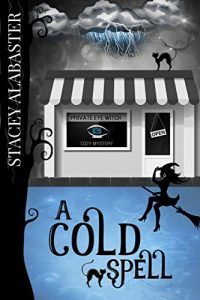 A Cold Spell by Stacey Alabaster:
A Cold Spell by Stacey Alabaster:
It’s a cold day in… Well, you know the saying
Ruby Swift is learning to use her paranormal powers and how to solve mysteries as a private investigator. Sometimes together. When a freezing spell goes wrong, she’s suddenly got more to worry about than just a murder investigation.
A Cold Spell is part of the Private Eye Witch Cozy Mystery series. If you like fun paranormal mysteries, you will love Ruby Swift and her magical adventures.
Get A Cold Spell and start solving your next supernatural mystery today!
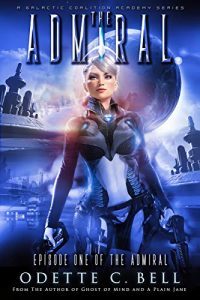 The Admiral by Odette C. Bell:
The Admiral by Odette C. Bell:
The battle for the galaxy starts now.
Lara Forest is a simple cadet in the Galactic Coalition Academy – or so she thinks. When she decides to quit, circumstances force her to reconsider. A hand from her future reaches through the past, and it a brings a war.
Soon Lara is thrust head-first into a battle for the Milky Way, not just in this time, but forever. She’s not alone. The meddlesome golden-boy Cadet Nok is with her. She might not appreciate his help now – one day, she will. But that depends on one thing – time. From now on, everything and everyone will depend on it.
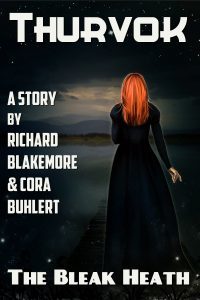 The Bleak Heath by Richard Blakemore and Cora Buhlert:
The Bleak Heath by Richard Blakemore and Cora Buhlert:
Thurvok the sellsword and his companions Meldom, thief and occasional assassin, and the sorceress Sharenna are fleeing across the Bleak Heath after saving Meldom’s childhood sweetheart Lysha from the gallows. Weary and exhausted, they are relieved to come upon a hut on the heath. But what they find inside that hut may well be more dangerous than the heath itself.
This is a novelette of 10500 words or approx. 35 print pages in the Thurvok sword and sorcery series, but may be read as a standalone. Includes an introduction and afterword.
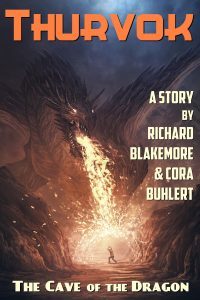 The Cave of the Dragon by Richard Blakemore and Cora Buhlert:
The Cave of the Dragon by Richard Blakemore and Cora Buhlert:
Thurvok, the sellsword, is enjoying a meal with his friends, Meldom, thief, cutpurse and occasional assassin, the sorceress Sharenna and Lysha, Meldom’s sweetheart whom the adventurers saved from the gallows, when a peasant woman asks them for help. Her young daughter Tali has been chosen to be sacrificed to the dragon that terrorises the area.
Thurvok and his friends want to help her and save Tali. But slaying a dragon is difficult, not to mention dangerous.
This is a short story of 4500 words or 18 print pages in the Thurvok sword and sorcery series, but may be read as a standalone. Includes an introduction and afterword.
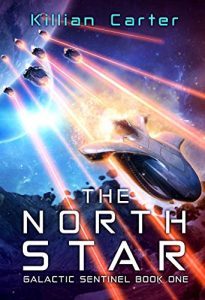 The North Star by Killian Carter:
The North Star by Killian Carter:
An ancient alien race, a sentient monkey, and epic battles.
Jason Grimshaw has one job…
Get the cadets to Colony 115.
Just another day. Just another milk run. Or so he thought.
When scanners pick up an unidentified alien vessel, it’s already too late.
With his ship blown out from under him, and his crew scattered across a war-torn planet, his day just keeps getting better.
The good news is, one of the pilots survived. The bad news is, it’s the biggest pain in his ass, and she’s stranded miles away.
When Clio Evans said she wanted to fly, crash-landing a starship wasn’t what she had in mind.
She may not be the most experienced Fleet pilot, but she sure as hell has a few tricks up her sleeve, and with an army standing between her and the rest of her crew, she’ll have to pull out all the stops, even if it means exposing a secret that’ll see her hanged for treason.
You’ll love this military science fiction adventure with a twist, because who doesn’t love overbearing Commanders, cocky redheads, and aliens with guns?
 Battle Royale Online by Victor Deckard:
Battle Royale Online by Victor Deckard:
It is 2053 and Earth is overpopulated. People desperately struggle for existence. Human life is extremely cheap nowadays.
As a way to deal with the dire effects and problems of the overpopulation, Battle Royale Online has been invented. It is a virtual reality video game where up to one thousand players kill one another off until there is only one survivor in the game. The gaming pods players use to connect to the game are unofficially called players’ coffins. There is a good reason for that: if one gets killed in the game, his or her pod gets deactivated, which results in the player’s death in real life. The sole winner of the game gets a huge amount of prize money.
Jason, a twenty-two-year-old guy, would never have decided to play Battle Royale Online had his mom not gotten in a car crash, which caused a brain tumor. She is in a comatose state and needs immediate surgical intervention. Jason doesn’t have enough money to pay for the surgery. Therefore, he decides to play Battle Royale Online.
Jennifer, his girlfriend, tries to reason with him. She tries to persuade him not to play the game because the odds of being the last player standing in this game are extremely slim. She also warns him that there may be cheaters and hackers in the game. Yet her pleas fall on deaf ears.
Later on, Jason finds out that Jennifer is going to play the game as well. Jason freaks out over her decision because there is no way they both can win the game. Even if they against all the odds defeat the other players, cheaters, and hackers, and make it to the final stage of the game, it won’t let them both leave the game alive. Jason has no idea what Jennifer was thinking when she decided to play the game as well. How the heck are they both going to win the game if there can be only one survivor?
 Captive of the Horde King by Zoey Draven:
Captive of the Horde King by Zoey Draven:
She made a deal with the Dakkari devil. Now, he owns her.
On the unforgiving planet of Dakkar, I did what all the humans in our village did: kept my head down, worked to provide for my family, and I certainly didn’t break any Dakkari laws to risk inciting the alien race’s merciless wrath.
Unfortunately, the same couldn’t be said for my brother and one careless mistake brings a horde of the nomadic, barbarian Dakkari straight to our doorstep, led by their powerful horde king—a cold, ruthless, battle-scarred warrior demanding retribution.
In order to save my brother’s life, I do the unthinkable.
I sell myself to the horde king as his war prize. I agree to warm his furs, to travel with his horde across the wild lands of Dakkar, and to never see my family again.
But as I struggle with my new reality, I discover that the surly, mysterious, dominant horde king never intended for me to be his concubine…
He wants me as his queen.
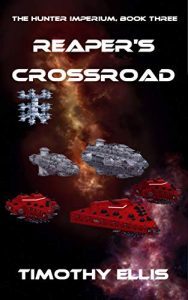 Reaper’s Crossroad by Timothy Ellis:
Reaper’s Crossroad by Timothy Ellis:
“The only one enjoying himself in there is the grim reaper.”
The Crossroad system is a battleground.
The Keerah only want to conquer. The Ralnor want control. The Trixone want new eating grounds.
All of them want what they think Jon Hunter has.
Jon is fighting a war on seven fronts, while trying to stay out of politics and diplomacy at home.
As the death toll mounts, Jon is confronted with options, all of which carry an unacceptable body count.
And in the midst of it all, old choices suddenly have consequences.
In the middle of everything, lies the Reaper’s Crossroad.
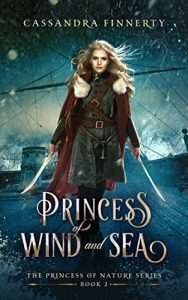 Princess of Wind and Sea by Cassandra Finnerty:
Princess of Wind and Sea by Cassandra Finnerty:
In 1773, the prince and princess travel across the globe on a series of secret missions.
Along the way, they run into unexpected dangers.
Aisling’s magical abilities are increasing, but dark forces who seek to destroy her powers are hunting them.
The prince must protect her at all costs, as they fight for survival and abiding love.
If you like fantasy, action-adventure and romance, you’ll love this novel by Cassandra Finnerty.
 No Planet for Good Men by M.R. Forbes:
No Planet for Good Men by M.R. Forbes:
Earth. After the invasion.
The planet is in ruins. Humankind struggles to survive.
Hayden is a Sheriff in a world without law. A good man in a world gone bad. He knows the fallout of an alien attack when he sees it. He’s never seen anything like this before.
Isaac is a Marine in a world without order. A good man with troubles of his own. His mission was to protect the innocent, including his son. Instead, he’s the only survivor.
Two good men. Two frightening discoveries. Two paths to one inescapable truth:
The invasion may be over, but the real fight is just beginning.
Go big or go home. For privateer Captain Magdalene Landon, it’s all about going big. For Kay Ellis, it’s about getting home. Together, they’re about to architect the most daring heist in the galaxy.
Kay knows too much. She knows it’s a matter of time before a Conglomerate hitman finds her. She’s desperate for safe passage back to Union space.
Then Magdalene shows up, promising a way home in exchange for that information. It’s a risky bet, but Kay is out of options. So she strikes a deal: the heist of the century for her freedom.
Kay is playing a dangerous game, and she knows it. She’s made herself Enemy Number One of the Conglomerate. She’s relying on privateers for her safety. It’s a fool’s game. But the worst part is, her fool’s heart is starting to warm to the enigmatic captain. And that’s a risk for which she hadn’t planned.
Every victory comes with a price
Krox’s assault on Shaya has been foiled, but the cost was bitter. Ternus lies in ruins, its gravity doubled by a god. Shaya is a paradise, but one populated by a mere handful of survivors. Only one power strong enough to oppose Krox remains… The Last Dragonflight.
Aran and his Outriders travel to Virkon to wake Virkonna, praying that she will join the war on their side. But neither Krox nor Nebiat is the true threat. Nefarius’s rebirth has been carefully orchestrated, and is finally at hand.
When the dust settles gods will die. Heroes will be slain. The sector will never be the same.
He was told he would use his powers for truth and justice…
Instead, Bobby has been given an impossible task…Hunt down and execute some of the most powerful superhumans in existence.
When his entire team of heroes goes rogue and begins committing acts of terror, he is ordered to bring his friends to justice.
But every encounter with his former allies bring up questions that can’t be answered, doubts begin to surface, and he is forced to make the terrible choice between duty and friendship.
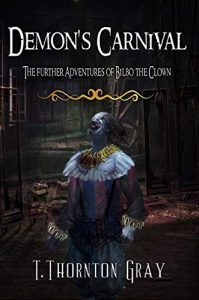 Demon’s Carnival by T. Thornton Gray:
Demon’s Carnival by T. Thornton Gray:
The promise of fun and thrills arrives with the rides and amusements atop the trucks of the traveling carnival. But beneath the balloons and lights lurks a foreboding monster seeking only to fulfill his darkest desires. The powerful and twisted desires of perverted mind that seeks the young and the pretty to use like play things. To use and destroy. To feed a never-ending desire for an unhinged ecstasy.
Join Bilbo the Clown and the good nun Sister Sledge, as they are again thrust into the icy demonic grip of evil. An evil unlike any they have yet encountered. This time Bilbo has met his match in more ways than you can imagine when he reaches the Demon’s Carnival.
Jess Flowers is the sole surviving guardian, sworn by oath and fate to protect the residents of the sleepy, isolated town of Salt Creek. But she’s failing. Innocent blood has been shed. Despite Jess’ best efforts, the killing hasn’t stopped. Bodies are piling up, and the other two guardians are dead, murdered by a killer who’s always one step ahead, always just out of reach.
Jess is a theikos, a race of people born with superhuman gifts, a race of people who have hidden safely in Salt Creek and isolated communities just like it for centuries. But the safe days are over, and time is running out.
The fate of the town and the lives of Jess’ friends, her family, and her one true love are on the line as a frightening truth suddenly becomes clear: The killing won’t stop until all the theikos are dead, driven to extinction. Someone has discovered their secret and is hunting them. The killer knows who they are, what they can do, and exactly where to find them.
 Book Haven And Other Curiosities by Mark Allan Gunnells:
Book Haven And Other Curiosities by Mark Allan Gunnells:
An eclectic mix of tales to entertain and engage the imagination!
Come peruse the dusty shelves of BOOK HAVEN. Scan the titles, study the strange trinkets that are lined up on display. Maybe pull aside the cobwebs and run your fingers alone the spines of the books, caress the artifacts. You will find many forgotten treasures and un-mined gems among the debris.
From the author of Flowers in a Dumpster comes a new collection of short stories to terrify you, to move you, to make you think. In the spirit of High Cotton by Joe Lansdale, Trigger Warnings by Neil Gaiman, and Skeleton Crew by Stephen King, this short story collection offers an eclectic mix of Horror, Scifi, Fantasy, and drama.
-The title novella features a futuristic landscape where the world’s literature has been lost, and a group of government agents are on the hunt for the mythological Book Haven, a vast secret library.
-In “C U Soon,” a girl dies in a car accident while texting with her boyfriend, but after her funeral he continues receiving mysterious messages from her.
-In “The Man Who Watched the Ocean,” a man mourning the loss of a past love decides to try and join her.
-In “Tanner” a man purchases a used tanning bed in which someone once died and finds that houses aren’t the only places that can be haunted.
-In “Human Bones in a China Cabinet,” a young man has an unusual collection hidden away in a china cabinet
-In “The Sandbox,” a friendless boy playing in a sandbox encounters a strange yet familiar old man who shapes the course of his life
-In “The Farm,” a horror fan visits the location of a cult classic
Some of what you find will be dark and suspenseful, some beautiful and haunting, but all of it is yours for the taking. We’re so glad you found your way here and welcome you inside BOOK HAVEN.
Proudly represented by Crystal Lake Publishing—Tales from the Darkest Depths.
Their children hunted. Their home seized. Their land threatened.
Once, Silas and Lainie Vendine, former bounty hunters turned renegade mages, had a home and ranch of their own and a position of respect in the town of Prairie Wells.
Now, mage-hating foreigners have driven them from their home. But the Chardonikans want more than Silas and Lainie’s ranch. Though they deny that magic exists, the foreigners are after Lainie and the children, Wildings-born of mage blood.
When their retreat from Prairie Wells turns into a flight for their lives, Silas and Lainie seek refuge in the forbidden canyonlands. But it isn’t only their family who are threatened by the ruthless, powerful Chardonikans; all the mages who make the Wildings their home and even the very magic of the Wildings itself are endangered.
With the Chardonikans intent on tearing their family apart, Silas and Lainie must find allies and discover the true nature of their enemies if they are to have any hope of fighting back and protecting the people and magic of the Wildings.
Mages’ Exile is the second book of Defenders of the Wildings, a follow-up series to the western-inspired fantasy series Daughter of the Wildings. It is a self-contained series and can be enjoyed even if you haven’t read Daughter of the Wildings.
 Burning Horizon by T.M. James:
Burning Horizon by T.M. James:
Nicole Greene is brought onto Earth’s first interstellar ship – the last place she ever wanted to be.
Completely out of her element, and with more questions than answers, Nicole finds herself surrounded by the best and brightest scientists that ever lived… a crew that soon begins to exhibit increasingly bizarre, frightening behavior. Not knowing who she can trust, Nicole soon discovers a dark secret aboard the ship… a secret that will ultimately leave the fate of mankind in her hands.
But, unfortunately for her – the only way to save mankind is to save herself first.
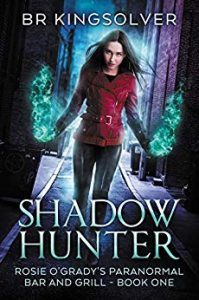 Shadow Hunter by B.R. Kingsolver:
Shadow Hunter by B.R. Kingsolver:
When my magic manifested at puberty, my parents sold me to the Illuminati. The Order of the Illuminati trained me as an assassin, spy, and thief. But when they sent me to steal a magical artifact that reveals Truth in all things, I discovered that I was working for the Dark and not the Light. The Illuminati trained me well, and paid the ultimate price for their deception.
Thousands of miles away, I landed a job in a quirky little bar. But the scattered remnants of the Order still strive for world domination, and no one leaves the Illuminati alive.
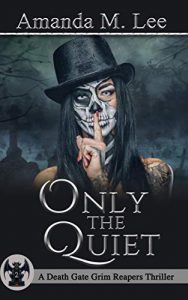 Only the Quiet by Amanda M. Lee:
Only the Quiet by Amanda M. Lee:
Izzy Sage is settling into her new life despite the pall hanging over her past.
While the memories of the catastrophe that took her parents when she was a child remain elusive, she finds she’s comfortable in her new environment … even though she happens to have taken up the same position her father held when he was killed.
She’s the new death gate operator, which means she’s in control when souls are ferried to the other side. She literally controls death … and it’s not a comfortable spot to be in.
Her only problem is a man … and it’s not something she thought she would be facing because romance was supposed to be off the table.
Braden Grimlock isn’t exactly known for being mature and grounded, but there’s something about Izzy that calls to him. He can’t stay away. The feeling only grows stronger when a group of deaf students tour the aquarium located on top of the death gate … and the teacher drops dead in the middle of a blackout.
Right away, Izzy senses something is wrong … other than the obvious, that is. She simply can’t figure out what sort of opponent she’s facing.
The past is about to meet the present as a long-hidden secret grabs Izzy by the throat and demands answers. There’s a malevolent spirit on the loose and he has designs on escape from Belle Isle. The havoc he could wreak if freed is immeasurable.
It’s up to Izzy and Braden … and the rest of the Grimlocks … to figure out what’s happening and stop a horrifically determined ghost from claiming an innocent life. It’s going to take all of them working together … and if a little romance gums up the works, they’re simply going to have to deal with that, too.
Izzy is a powerful Bruja. Even she might not be strong enough to face the horror of what’s to come, though.
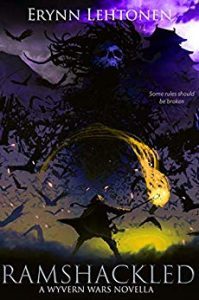 Ramshackled by Erynn Lehtonen:
Ramshackled by Erynn Lehtonen:
Some rules should be broken.
The dragons are gone, but their ki remains within the fabric of the world, and only those with the knowledge to access it might use its power. For centuries, the Genshu family has supported the Seiryuu Emperors, Empresses, and Shoguns during periods of war and prosperity. Now they would see their line of warriors and majyu put to an end.
But twin brothers Masanori and Hidekazu Genshu have other plans.
To the eye of the public, they dutifully follow their parents’ demands and don’t learn how to fight. But in the early hours of the morning, far from home, they practice in secret. Until the day Tsukiko City is attacked, a woman is kidnapped, and life returns to normal without a second thought.
The day Masanori and Hidekazu realize they can’t sit on the sidelines any longer.
Masa and Hide’s journey begins in Ramshackled, the first of four novellas prefacing the Wyvern Wars series: an epic fantasy adventure inspired by selections of Japanese mythology and folklore.
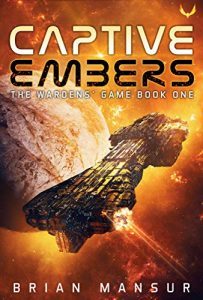 Captive Embers by Brian Mansur:
Captive Embers by Brian Mansur:
The humans wage war across space.
But who is the real enemy?
Mykonian fleet Operative Rafe Hastings has spent several tours around Belia trying to keep weapons traffickers from tearing the local space habitats apart. He’s eager to go home when an informant passes him dire news about an infamous cartel boss named Lilith. Not only has she acquired nuclear weapons, but she has somehow gained permission from the mysterious robotic overlords of inhabited space – the Wardens – to use them.
The battleship Tsunami is dispatched to investigate Rafe’s discovery and veteran operations Officer Sean Merrick soon finds himself caught in a conspiracy involving feuding Wardens. With allies dying all around him, his only hope for survival turns out to be a junior combat nurse named Sarah Riley who has scarcely fired a gun before.
As Rafe, Sean, and Sarah battle Lilith, they’ll be forced to rely on the unexpected to save the people they love. But with the Wardens constantly changing the rules, could it be that no matter who wins the war, everyone loses?
The SLS Excelsior has a million credit bounty on her, and pirate captain Christopher Raleigh leads his crew to claim the prize. But with the Digital Assassin and the Tetrarch’s daughter onboard, no plans can ever be safe.
When Space Marines recapture Jillian in the midst of battle, Raleigh and his crew have to find a way to get to Clarion and take her back. Or die trying . . .
Don’t miss the second installment of this action-packed space opera adventure! Contains the bonus chapters not available online.
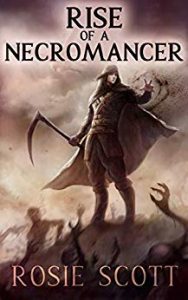 Rise of a Necromancer by Rosie Scott:
Rise of a Necromancer by Rosie Scott:
Many people want Cerin Heliot dead.
While studying to be a mage at a prestigious university, Cerin is seized by an obsession with necromancy. When his secret knowledge of the forbidden magic is discovered, he becomes one of the nation’s most-wanted criminals overnight, sending his life into a tragic downhill spiral.
In this gritty story of survival, Cerin learns the hard way that to make it in a cruel world, he must become its match. Rather than run from the law forever, he builds an undead army to face it and make it fear his name. When all living loved ones are lost, Cerin must rise to be a master of the dead.
Rise of a Necromancer is a standalone character-driven origin story in the Six Elements universe.
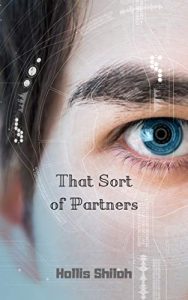 That Sort of Partners by Hollis Siloh:
That Sort of Partners by Hollis Siloh:
When Jake is assigned to work with the new guy at the precinct—their first robot cop—he’s nervous, to say the least. But his new partner turns out to be a great guy on every level. They work together and learn from each other—and then feelings start to develop.
Jake never thought he’d be the sort to fall for his partner. Or a robot.
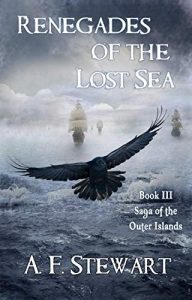 Renegades of the Lost Sea by A.F. Stewart:
Renegades of the Lost Sea by A.F. Stewart:
A god, his mother, and a Nightmare Crow.
Old enemies surface once again and undead pirates roam the seas. The man he killed, Black Axe Morgan, has returned for revenge on Captain Rafe Morrow, while from the shadows the Nightmare Crow reveals his true self. The two form an alliance and bring mayhem to the seas, all to draw out Captain Morrow and his crew.
Yet, this time, Rafe doesn’t face his enemies alone. Death walks the Outer Islands to save her son and the Sovereign of the Gods leads Captain Morrow past all the lies to the truth. The fate of Chaos and Harmony itself hangs in the balance of this fight.
Will centuries of schemes and plans reforge the bond of the realms, or will the Seven Kingdoms and the Outer Islands fall?
Can the God of Souls find his destiny before it is too late?
The endgame of gods begins…
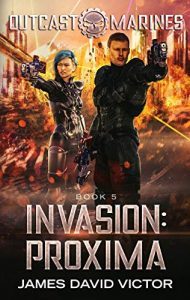 Invasion: Proxima by James David Victor:
Invasion: Proxima by James David Victor:
The most dangerous enemy is the one who knows you inside and out.
A Military Science Fiction adventure from #1 Bestselling author James David Victor
Solomon and the Gold Squad are back on Ganymede recovering from the shock of learning true nature of the war. When they are betrayed by a comrade, they barely escape with their lives. Their only chance is to take the battle directly to the enemy. Can they successfully invade Proxima and save humanity?
Invasion: Proxima is the fifth book in the Outcast Marines series. If you like science fiction with “heroes” who are anything but, the Outcast Marines will suck you into their battle to save humanity, from itself and the rest of the galaxy.
Boston, 1984. Even in a world without cell phones, messages come through loud and clear if one is listening. When thirty-something Nora Forrest travels to Manhattan to see a Broadway play starring her idol, an aging Irish actor named Hugh Sheenan, she doesn’t know whether what happens in the theater that night should be credited to witchcraft, extrasensory perception, synchronicity, or simple accident?and she knows that many people would tell her nothing had happened at all. Told through the voices of four people, Gillyflower is a story about intersections and connections?real, imaginary, seized, and eluded. It’s a book about everyday magic, crystalline memory, and the details that flow through time and space like an electrified mist. It’s a detective story, a love story, and a coming-of-age story?for the never really young and for the almost old.
 Send to Kindle
Send to Kindle
April 28, 2019
The Joy of Writing, How to Lose It and How to Get It Back
First of all, I’d like to share a couple of promotions, because who doesn’t love free or cheap books?
The first of those promotion is the Mirth & Mischief sale at Double-Cross Lit, where you can get fifteen e-books, including one of mine, in two genres, thriller and humor, all for 99 cents.
I also have a book in the Out of this World Romance giveaway at StoryOrigins, where you can get 32 different science fiction, fantasy and paranormal romance e-books for free, if you sign up for the author’s newsletter (Don’t worry, you can unsubscribe later). So if you like a bit of romance with your SFF and/or if you’ve always wanted to try my In Love and War space opera romance series, check it out!
And now the commercial break is over, let’s get to the meat of this post. Regular readers of this blog may know that I’m a big fan of Kristine Kathryn Rusch and her Business Musings series of writing and business advice. Indeed, it was Kristine Kathryn Rusch and Dean Wesley Smith who persuaded me to give self-publishing a try, because if those two respected figures in the SFF genre said it was okay to self-publish, then it probably was.
Two weeks ago (yes, I’ve been meaning to write this post for a while, but then stuff happened and other topics demanded to be written about), Kristine Kathryn Rusch posted an entry in her Business Musings series about the fun of writing, how easy it is to lose it and how to recover it.
This post resonated with me, because my experiences have been similar. I’ve also been making up and telling stories for as long as I can remember and eventually started writing them down. Unlike Kris Rusch, I didn’t start writing seriously, until I was in my teens, but there are certainly earlier story attempts buried somewhere in my parents’ attic. And of course, I loved it when we were actually allowed to write stories in school, which happened all too rarely, because in 1980s West Germany writing assignments even in elementary school usually meant “Read this (usually totally boring) story and write a retelling” (My attempts to improve on the inevitably dull stories to make them better were not appreciated) or at best “Write about an exciting experience you had” (But not too exciting, because appearances of aliens, unicorns, dragons etc… were not appreciated either – realism was the order of the day).
Any kind of fiction writing vanished from the syllabi of German classes altogether around sixth or seventh grade, but I continued making up and writing stories, though I wasn’t quite clear about which medium to use to tell my stories at first and so my early attempts include the screenplays plus some drawings for two animated movies (I had seen a documentary about stop motion animation and wanted to try that, not knowing what a huge workload it is) as well as an opera libretto complete with music. I can still hum some tunes from that one. Eventually, I started writing science fiction and switched to English, because all the science fiction I read except Perry Rhodan was in English, too.
In university, I took every creative writing class I could, including the poetry classes, and even was on the staff of the English language literature magazine of the university. I learned a lot, even though my plot-heavy SFF or crime fiction stories didn’t really fit into a literary culture that valued poetically written vignettes about doomed love stories between exchange students (those were so common, I nicknamed the genre “tragic Erasmus romance”), couples having breakfast, while the cracks of their relationships were exposed, women baking cookies and reminiscing about their grandmothers or – this is one was so awful I remember it twenty years later – a fly musing about art history, while observing a couple’s troubled relationship breaking up. I pointed out that regular domestic flies live maybe a month, that their brains don’t even remotely work like ours and that I really couldn’t imagine one of them musing about art history, but my objections were shot down. Quite a few of my stories have their origin in something I wrote for a university creative writing class, though only two stories of mine were ever published in the university literature magazine – all other publications I had there were poems.
But what really resonated with me about Kristine Kathryn Rusch’s post were her early experiences with the world of SFF writing. Here is a quote:
I wanted to be published, though, so I went to Clarion to learn how to become a published fiction writer. I learned a few things, but mostly how to critique stories. I also learned that much of what I loved was “garbage” and I “shouldn’t waste my time at it.”
So I wrote a lot of it in secret. Those romances—fuggetaboutit. That space opera—keep it in a drawer.
I learned that the things I loved the most were old, and hackneyed, and Not Worth My Time.
Not just from Clarion, but from the entire sf culture around me. I had gotten into sf because I loved Star Trek and Star Wars, and I thought that was science fiction. Whoops, I was wrong. But sf did have a lot of short fiction markets, and I loved writing short stories with plots, not the slice-of-life vignettes that passed for short stories in the mainstream markets in the 1980s. Besides, those slice-of-life stories had to be “muscular” (meaning “masculine” of a certain macho, emotionless type), and I didn’t do “muscular.” At least, not with men as the main character. If I wrote “muscular,” the main character was female, and really, who wanted to read that?
(Kris raises a cautious hand. Me. I want to read that.)
Getting into the world of professional fiction writing, even thirty years ago, was all about the don’ts and never about the do. And slowly the fun leached from my writing.
Unlike Kristine Kathryn Rusch, I never went to Clarion. I probably could have scraped the money for the workshop itself together, but since Clarion only happens in the US (and for a while in Australia), I’d have to spend a lot of money on plane tickets, car rentals, etc… in addition to the workshop fees and that just wasn’t happening. But nonetheless, her experiences remind me very much of mine, once I got on the internet and found the online SFF community.
Up to then, I’d been reading and writing SFF mostly in isolation. I had a decent collection of SFF non-fiction (that’s probably why I feel so strongly that the Best Related Work category at the Hugos is for genre-related non-fiction), including a copy of the Encyclopedia of Science Fiction, which I used as a guide to find more books and authors to read, and I also grabbed whatever SFF magazine I came across, usually media mags like Starlog, SFX, Cinefantastique or Famous Monsters of Filmland, usually backissues, because new issues were horrenduously expensive. Fom these sources, I compiled lists of authors, books and movies to check out. But mostly, my method of finding books and authors to read was browsing the limited foreign language shelves at the bookstore and buying whatever looked interesting. That method served me well, too, because I found a lot of books and authors I enjoyed.
But once I got on the internet and found the online SFF community, I realised that I had been reading the wrong books all those years. I eagerly sought out the books that were recommended as the ones to read and found that I disliked approximately ninety percent of them. As for writing, the stories I wanted to tell were old-fashioned, hackneyed, scientifically illiterate and not worth bothering with. Mind you, this was the turn of the millennium, the time of singularity fiction, New British Space Opera, the New Weird, mundane science fiction and the early stirrings of grimdark fantasy, which didn’t even have a name yet or at least not the name by which it would eventually become known. And none of those genres and trends were even remotely what I wrote or liked to read. I did write a parody of the New Weird type stories overburdened with tortured metaphors that were popular around the time. It will probably never see publication, at the time because the joke was too on target (I was pretty sure editors wouldn’t appreciate me making fun of then highly regarded stories and authors) and now because its time has passed.
I did send out a submissions to magazines, quite a few of which don’t exist anymore, but I self-rejected stories more often than I sent them out (“It’s old-fashioned and besides, their submission guidelines say that they don’t want stories about X”). The reactions I got – form rejections or a complete black hole – weren’t encouraging either. Besides, in those days submissions were still mostly by snail mail, which was very expensive, when you lived outside the US and had to bother with international reply coupons (oh, how I hated the damned things), too.
Eventually, I concluded that I simply had a horrible taste in SFF and was obviously too stupid to write it, especially when scientific articles completely failed to inspire story ideas in me, even though this was supposedly how all the “real SF authors wrote”. In short, the atmosphere in the SFF community in the early 2000s completely destroyed my joy in both writing and reading the genre.
I turned to other genres, read and wrote mysteries and crime fiction (which unfortunately have a tiny short fiction market in the English speaking world), rediscovered romance after a brief and unsatisfying brush with the genre during the bodiceripper days and eventually found a few obscure magazines, most of them long defunct, that actually liked my old-fashioned and hackneyed stories like the first few Silencer adventures (including Flying Bombs which had been rejected by a then fairly high profile SFF anthology, even though it perfectly fit what they were looking for).
I eventually came back to reading SFF via urban fantasy and paranormal romance, which reignited my love for the genre. I also found science fiction romance and though much of it didn’t get the worldbuilding versus romance balance right, the books that did were so worth it. But even though I was reading SFF again, I wasn’t writing it, because I still had that voice in my had that told me that I’d never be a real SFF writer, because my taste in SFF was horrible and besides I was too stupid to get inspiration from science articles.
So I tried my hand at romance, which was a big market and welcoming community. But SFF elements kept creeping in (not too mention that my writing is too gritty for the tame US romance market) and so my attempt at a regency romance turned into a curious regency steampunk hybrid complete with airships and even chemical weapons. I should probably revise and publish that one some day, since it had potential. Meanwhile, my attempt at a contemporary romance not only contained all sorts of no-nos such as swearing and people having sex, while one of them was theoretically in a relationship with someone else, but also had the characters have long, geeky conversations about Doctor Who and Star Wars. Even the title was (and is) unpublishable, since you cannot use the f-word in a book title (it was supposed to be called “Fuckbuddies”). Still, I wanted to write a contemporary romance that actually felt contemporary and was about people I recognised and that’s what I did. I’m not sure if that thing is salvagable at all, though I’m still glad I wrote it, because it taught a lot about writing emotional scenes and also about describing life with warts and everything.
When self-publishing suddenly became a viable alternative, it also brought the joy of writing back, because suddenly every story idea was potentially viable and no longer subject to “But is there a market for this?” considerations. Who cares if there is no established market for this story, I’ll simply make my own. But nonetheless, I didn’t get back to writing science fiction, even though it was my first and best love, because I still had that voice in my head that told me, “You can’t do that in science fiction.” Until I chanced to read the Deathstalker series by Simon R. Green, where Green basically threw everything (vampires, werewolves, flying castles, superpowers, a whole planet of homicidal toys, 80-page scenes of political debates at court, etc…) and the kitchen sink, too, in, just because he felt like it. And I thought, “If he can do it, then why the hell can’t I?” So I started writing exactly the sort of space opera I really wanted to write and so Shattered Empire (to which I should really get back some time) and In Love and War were born.
Unfortunately, within the space of a few years, the whole climate of indie publishing changed from “We can write whatever we want, hear us roar” to a “Write to market and strictly adhere to the genre tropes readers demand” ethos that is much more restrictive than traditional publishing ever was. And so we get entire categories in the Kindle store that are dominated by cookie cutter books, because that’s what the market supposedly wants. It’s a depressing development, especially considering that “freedom to tell the stories we want” was one of the main reasons writers went indie in the first place.
Would I sell more, if I stuck to one genre, one series and wrote the sort of thing that the “market” a.k.a. American Kindle Unlimited subscribers apparently wants? Probably. But I don’t particularly want to write about manly space marines killing evil insectoid aliens in space or young men who get sucked into videogames, where they become the biggest Gary Stu ever and all the women want to have sex with them. Even if I try to write that sort of story – A Mess of Arms and Legs and Limbs was my attempt at a “pew, pew, let’s kill all the aliens” story – it usually turns out quite different from what the market supposedly wants.
Therefore, Kristine Kathryn Rusch’s post about the joy of writing is important for both indies and traditionally published authors. Because sadly, it’s all too easy to lose the joy of writing and forget why it was fun in the first place.
 Send to Kindle
Send to Kindle
Indie Crime Fiction of the Month for April 2019
 Welcome to the latest edition of “Indie Crime Fiction of the Month”.
Welcome to the latest edition of “Indie Crime Fiction of the Month”.
So what is “Indie Crime Fiction of the Month”? It’s a round-up of speculative fiction by indie authors newly published this month, though some March books I missed the last time around snuck in as well. The books are arranged in alphabetical order by author. So far, most links only go to Amazon.com, though I may add other retailers for future editions.
Our new releases cover the broad spectrum of crime fiction. We have cozy mysteries, small town mysteries, historical mysteries, WWII mysteries, paranormal mysteries, crime thrillers, psychological thrillers, forensic thrillers, legal thrillers, action thrillers, spy thrillers, police procedurals, romantic suspense, private investigators, amateur sleuths, lawyers, serial killers, missing children, missing detectives, missing agents, amnesiac spies, forensic geologists, crime-busting witches, sinister carnivals, murder on university campuses and aboard cruise ships, in Hawaii, the Grand Canyon, Hollywood, rural Ohio, rual Nebraska and much more.
Don’t forget that Indie Crime Fiction of the Month is also crossposted to the Indie Crime Scene, a group blog which features new release spotlights, guest posts, interviews and link round-ups regarding all things crime fiction several times per week.
As always, I know the authors at least vaguely, but I haven’t read all of the books, so Caveat emptor.
And now on to the books without further ado:
 A Cold Spell by Stacey Alabaster:
A Cold Spell by Stacey Alabaster:
It’s a cold day in… Well, you know the saying
Ruby Swift is learning to use her paranormal powers and how to solve mysteries as a private investigator. Sometimes together. When a freezing spell goes wrong, she’s suddenly got more to worry about than just a murder investigation.
A Cold Spell is part of the Private Eye Witch Cozy Mystery series. If you like fun paranormal mysteries, you will love Ruby Swift and her magical adventures.
Get A Cold Spell and start solving your next supernatural mystery today!
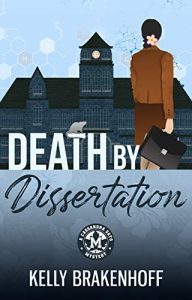 Death by Dissertation by Kelly Brackenhoff:
Death by Dissertation by Kelly Brackenhoff:
Ambitious Cassandra Sato traded her life in Hawai’i for a dream position as Student Affairs VP at Morton College in tiny Carson, Nebraska. She expected the Midwestern church casseroles, land-locked cornfields, and face-freezing winters would be her biggest challenges, but it’s her job that’s rapidly becoming a nightmare.
A deaf student is dead and the investigation reveals a complicated trail of connections between campus food service, a local farmer’s beef, and the science lab’s cancer research. Together with her few allies, Cassandra must protect the students caught up in the entanglement.
Dealing with homesickness, vandalism, and a stalker, Cassandra is trapped in a public relations disaster that could cost her job, or more. No one said college was easy.
 Fortune Furlough by Jana DeLeon:
Fortune Furlough by Jana DeLeon:
It’s not a vacation until there’s a murder.
Fortune, Ida Belle, and Gertie are finally off to Florida on the vacation they’ve always talked about. Days filled with white sand, turquoise water, and fruity drinks are the only thing on the agenda. But when Gertie’s “hot date” turns up dead and she’s the number one suspect, they’re forced to hang up their bathing suits and shift to investigating mode.
They soon discover that Gertie’s beau was up to all kinds of shady behavior, leaving them with a long list of people who are happy he’s dead. But which one resorted to murder?
There are plenty of ways to die in the Grand Canyon.
Forensic geologists Cassie Oldfield and Walter Shaws investigate one way: trouble on the canyon’s Colorado River. Stranded raft. Life vests unused. Rafters missing.
The only clue to the fate of the rafters is a bag of pebbles caught by the bow line. Following that clue, the geologists uncover a hellish scheme. Not only are the rafters in peril, but the river itself is under attack.
The race to stop it takes Cassie and Walter deep into the canyon, and onto the mighty river, putting their own survival at stake.
 In Her Defence by Jan Edwards:
In Her Defence by Jan Edwards:
Bunch Courtney’s hopes for a quiet market-day lunch with her sister are shattered when a Dutch refugee dies a horribly painful death before their eyes. A few days later Bunch receives a letter from her old friend Cecile saying that her father, Professor Benoir, has been murdered in an eerily similar fashion. Two deaths by poisoning in a single week. Co-incidence? Bunch does not believe that any more than Chief Inspector William Wright.
Set against a backdrop of escalating war and the massed internments of 1940, the pair are drawn together in a race to prevent the murderer from striking again.
An actress is murdered at a Hollywood house party and a naive young man stands accused.
In this debut novel, greenhorn attorney Ezekiel Blackbird has something to prove as he struggles to establish his own practice in Los Angeles straight out of law school. Eager but insecure, Zeke would prefer to attract easier, high-paying corporate clients, but he can’t refuse the chance to represent an alleged murderer who desperately needs his help. His love life is in tatters and his physical safety is under threat, but Zeke remains loyal to his client despite the difficult lessons he must learn to become a shrewd criminal attorney.
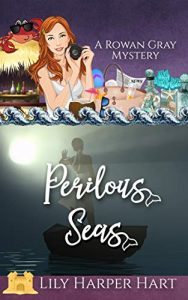 Perilous Seas by Lily Harper Hart:
Perilous Seas by Lily Harper Hart:
Her father may be back in her life but things are hardly smooth sailing for Rowan Gray.
He faked his death to get away from a group of people investigating psychic abilities – a group he is convinced is still out to get him – and he’s positive the group want his daughter for the same nefarious reasons.
Rowan is simply happy to have him in her life. She gets to spend time with him and her uncle and plot for a future they might never have.
All that’s thrown into turmoil when The Bounding Storm, the cruise ship where Rowan works, stumbles across a family that’s been lost at sea for weeks. Only some of them are on the rescue ship her boyfriend Quinn Davenport brings back, though. The rest are missing and lost.
What happened to the other family members? That’s the question on everybody’s lips as the media descends. The family at the center of the rescue is rich, essentially American royalty … and the horror of what they went through makes for a terrible tale.
The problem is … the story doesn’t hold water.
When a hand belonging to one of the deceased washes up on the beach, miles away from where the family went missing, things start to fall apart … and fast.
It’s up to Rowan and Quinn to discover the truth while working on their own investigation into a group of people that may well mean to do Rowan harm.
It makes for a busy – and dangerous – few days. All they have to do is survive to find the answers they seek.
That’s easier said than done.
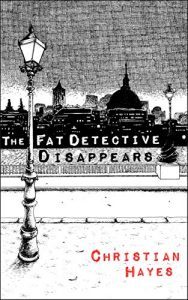 The Fat Detective Disappears by Christian Hayes:
The Fat Detective Disappears by Christian Hayes:
Where on earth is Eugene Blake?
Eugene Blake has gone missing and it’s up to amateur detective Christina Walker to do everything she can to find him.
She uses her sleuthing skills to uncover a cache of notebooks that she is certain will hold the answer to Eugene’s fate.
Meanwhile Eugene is at the centre of his own mystery that he is desperately trying to solve.
The Fat Detective Disappears is the ingenious final puzzle in the Eugene Blake Trilogy by London novelist Christian Hayes.
Read now to discover Eugene’s final mystery
 Black-Market Body Double by Vicki Hinze:
Black-Market Body Double by Vicki Hinze:
IF TROUBLE FINDS YOU, YOU WANT HER ON YOUR SIDE
Captain Amanda West is assigned to the elite S.A.S.S. Unit. All its Secret Assignment Security Specialists are highly trained and well experienced covert operatives. While on a mission, Amanda is buried alive in a tomb by S.A.S.S. nemesis and black-market broker Thomas Kunz who elevates ruthless to new heights. Amanda escapes and is astonished to learn she has been missing not for three days but for three months!
And soon she discovers another who has an unexplained three-month absence. An operative in a highly classified and sensitive position, Captain Mark Cross. Working together, Amanda and Mark must discover what happened to them and why. And they must determine if there are others like them. In their line of work, finding the truth is essential not only for their careers but for the lives of those in the nation they have taken oaths to defend and protect. What Kunz could be up to chills them both. But as bad as that is, it pales to what he is actually doing. Can Amanda and Mark stop Kunz before he attains his goal? Kunz wants nothing more than to destroy the entire nation!
 Luke on the Loose by Amanda M. Lee:
Luke on the Loose by Amanda M. Lee:
Luke Bishop is the center of attention and life of the party at Mystic Caravan Circus. He’s a great guy, who just so happens to be in a bit of a funk. That doesn’t change when the circus hits Ohio, one of their least favorite stops.
Since nothing ever happens in Ohio. The group believes that will hold true during another boring trip. They find out better after the first night, when one of their clowns is killed.
They know right away what they’re looking for: an incubus, a creature that lures women with his song and then kills them in an intimate manner. All the men are on full alert because that means the Mystic Caravan females are in danger.
Luke takes it upon himself to infiltrate an area biker bar where the killer may be hanging out. All he has to do to find the culprit is fit in, not tip his hand, and make sure his partners in crime don’t draw too many sets of eyes in their direction.
It’s a difficult job, but Luke is up to the task … that is if he doesn’t fall victim himself. The circus men are joining together to protect the women for a change, and it’s going to be a dangerous ride.
Patricia may be well-traveled – but this is a mystery with a dangerous destination.
Patricia always viewed the world from the end of her pen. Her feet hop from place to place; her exotic experiences are filling the pages faster than stamps on her passport. Someday, she aspires to land a big-time publishing deal.
At a stopover in Atlanta, she is shocked to discover the body of a local businessman, Peter, dumped in a camp in the outskirts of the city. For the first time, her wings are clipped as the lead detective; Brian Johnston launches an investigation into Peter’s death – firmly suspecting that cause of death was murder.
Patricia and Brian band together in his murder investigation, slowly uncovering leads to a shady underbelly behind Peter’s flashy ‘successful’ exterior, and the illicit dealings he was determined to keep from prying eyes. As the details begin to piece together, someone intends to step in and silence them. By any means necessary.
Paradise hides a master thief.
What if diamonds aren’t a girl’s best friend?
A heist at a high-end auction house sends tech specialist Sophie on a new case hunting down a thief whose skills match her own. Even as she chases a cache of precious gems, events begun in a distant land threaten the fragile happiness Sophie’s building—and an enigmatic new partner brings challenges close to home, luring Sophie into the world of vigilante justice.
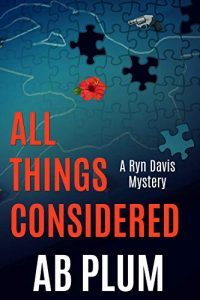 All Things Considered by A.B. Plum:
All Things Considered by A.B. Plum:
The police say Ryn Davis is guilty of murder.
Ryn claims she was asleep. Sound asleep. Dead-to-the-world asleep.
An insomniac with a long history of sleepwalking, night terrors, and other sleep disorders, Ryn’s dodging a life-changing decision. Should she leave her iconic rock-star lover? Is his fame and money worth his mood swings? After a particularly explosive argument, she goes to bed. He follows. The argument escalates. Exhausted, she goes to the guest bedroom. She pops a sleeping pill. Technically, a hormone. Not a drug. One melatonin, she rationalizes, determined to think more clearly.
She wakens the next morning, groggy and disoriented. Fragments of a dream fade in and out of memory. Not the argument with Stone … but something more disturbing. When she enters their bedroom, she sees him in bed—a red hibiscus blooming on his chest.
Unable to produce the melatonin bottle, Ryn acts more and more defensive and guilty. The police ridicule her testimony. Definitely bitter, can she prove how an insomniac slept through two bullets?
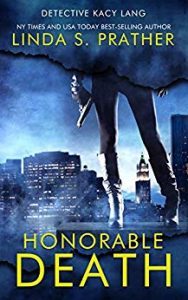 Honorable Death by Linda S. Prather:
Honorable Death by Linda S. Prather:
Detective Kacy Lang wasn’t surprised when the body of her twin brother washed up from the icy depths of the Chicago River. She’d known since the day she graduated from the academy that one day he’d wind up on her beat, and she’d have to arrest him… or kill him. She could accept the fact he’d been murdered. What she couldn’t accept was the massive torture he’d endured before his death. Someone would pay for that.
A multilayered, fast-paced archaeological dig of a mystery.
When Sergeant Brad Braun is called to a scene in a familiar location, what looks like an average murder case quickly turns into something that is far from typical. The dead man is someone from Braun’s past, and the body happens to be located in the exact spot where Braun last saw him.
With no witnesses and almost a total lack of evidence, law enforcement is scrambling for clues. Another dropped-off body quickly follows the first, left in the same spot, and Braun is once again familiar with the deceased.
As the killer claims more victims, Braun begins to connect the dots. Unfortunately, the last dot may connect straight to the sergeant himself.
 Don’t Lie to Me by Willow Rose:
Don’t Lie to Me by Willow Rose:
When twelve-year-old Sophie Williams went on a Girl Scout summer camp, she never returned home.
Three months later, her body is found inside her sleeping bag in the most frequented area of Cocoa Beach, and the town is outraged.
The girl isn’t just any child. She’s the town’s most beloved surf idol, and it was believed that she could be the next Kelly Slater.
As another child, the son of a well-known senator is kidnapped, and the parents receive a disturbing video, FBI profiler Eva Rae Thomas — who has just returned to her hometown, divorced and out of a job — plunges into the investigation, breaking her promise to her children not to do police work again.
Local law enforcement, with her old flame Matt Miller in charge, are the ones who ask for her help in a case so unsettling that only she can solve it. But the deeper they dig, the deadlier it becomes for Matt and Eva Rae. Soon, everyone she holds dear is in grave danger as this case hits a little too close to home.
DON’T LIE TO ME is the first book in the Eva Rae Thomas Mystery Series and can be read as a standalone.
 Presumption of Guilt by Rachel Sinclair:
Presumption of Guilt by Rachel Sinclair:
A wealthy family with DARK secrets.
A SHOCKING reveal that you guaranteed won’t see coming…
Avery Collins is an attorney with the tender heart of a warrior for the wrongfully accused, for one simple reason. She was once wrongfully accused, and spent 7 years in prison for a murder she didn’t commit.
Now sworn to protect the indigent accused, she’s persuaded to represent Esme Guitierrez, an El Salvadoran refugee who is accused of killing 21-year-old Aria Whitmore. Aria was the daughter of the prominent billionaire hotelier Jacob Whitmore, and was also an aspiring concert pianist and music composer.
As Avery digs further into the case, she realizes that there were some sick games taking place behind the closed doors of the Whitmore mansion, and Avery ends up with more questions than answers.
What happened to Aria’s birth mother?
How did Julian Rodriguez, a young schizophrenic man, come to befriend Aria?
And who is sending threatening emails that are filled with facts that are not widely known to the public?
When Avery finds out the answers to these questions, she’s shocked. But she also realizes that the big reveal opens up more questions than answers, and the case takes an unexpected turn.
As time runs out to find the true culprit, Avery faces the trial of her life. Amidst an intense media glare, death threats, protestors and stalkers breaking into her home, Avery nonetheless gives this case her all.
Because if she doesn’t, her client will end up on death row.
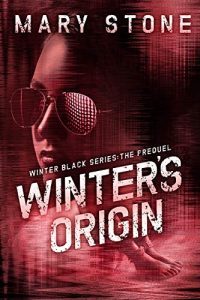 Winter’s Origin by Mary Stone:
Winter’s Origin by Mary Stone:
What doesn’t kill you makes you stronger. And sets you on a path of revenge.
When The Preacher targets her family for his last kill, Winter Black is the only survivor. After recovering from the brain injury she received that brutal night, Winter single-mindedly pursues a career as an FBI agent. Her unexplainable talents, discovered after her coma, might be the key to taking down the notorious serial killer… unless he finds her first.
Welcome to Winter’s Origin, the prequel to the soon to be released Winter Black crime fiction series. If you enjoy gripping crime solving, hair-raising villains, and riveting suspense, then you’ll love Mary Stone’s debut page-turning series.
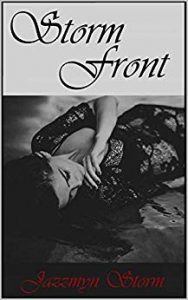 Storm Front: Memoirs of a Secret Agent by Jazzmyn Storm:
Storm Front: Memoirs of a Secret Agent by Jazzmyn Storm:
When a spy loses her memory, she doesn’t know who to trust…or what to believe.
I felt myself flying through the air, and I was strangely calm for a moment as the reality of the situation faded away. This wasn’t happening. It couldn’t be happening. I’d wake up any moment and realize it was all a bad dream.
Then, I hit the water.
What happens, when the people you thought you could trust betray you? That’s bad enough in any relationship…but when you’re a spy, it can be deadly.
 Send to Kindle
Send to Kindle
April 22, 2019
In Memoriam Martin Böttcher
German film composer Martin Böttcher (1927 – 2019) died April 19th aged 91. Once again, there is no English language obituary, but here are some German ones from Tagesschau, RP Online and Deutschlandfunk Kultur. Deutschlandfunk Kultur also has a nice profile of Martin Böttcher with some musical analysis by Oliver Schwesig.
Together with Peter Thomas and Klaus Doldinger (both of whom are still alive), Martin Böttcher formed the trifecta of the great film composers in post-war (West) Germany. All three started out as jazz musicians and those musical origins also determined the course of (West) German film music for decades.
Martin Böttcher’s early life did not seem to predispose him to a musical career. Due to a childhood injury, he was deaf in one ear and initially showed little interest in music. Instead, young Martin dreamed of becoming a pilot. Those dreams were derailed, like so many, by World War II. Böttcher was drafted towards the end of the war, when the Nazis were drafting every male German aged 16 to 60. He survived and wound up in a prisoner of war camp, where he taught himself to play the guitar. After his return home, he joined the dance orchestra of the newly established North West German radio NWDR (nowadays known as NDR) as a guitarist.
By now, Böttcher had also started composing and eventually left the orchestra to become a film composer. The first movie for which he composed the music was the otherwise forgotten 1955 war movie Der Hauptmann und sein Held (The Captain and His Hero). It’s part of a series of West German WWII movies made in the second half of the 1950s, which are quite critical of the Nazis and militarism and inevitably contrast the Nazi true believers (often officers who senselessly send soldiers to their deaths) with common soldiers who are just victims of the system. I guess the brief popularity of such movies was one way of people coming to terms with World War II. I found a trailer for Der Hauptmann und sein Held on YouTube, where you can hear Böttcher’s music.
Martin Böttcher’s next work as a film composer was a minor classic, the 1956 juvenile delinquent drama Die Halbstarken (the English title is apparently Teenage Wolfpack), starring a young Horst Buchholz, who would go on to be one of The Magnificent Seven, and an even younger Karin Baal as a teen femme fatale. Die Halbstarken is a nice period piece and important to German movie history, but I have to admit that I was kind of disappointed when I first saw it. Karin Baal is great as the bad girl with the angelic face, but Buchholz’ character basically just wants the same bourgeois 1950s life as the parent generation, he only wants to use crime as a short cut to get there. That’s not how I imagine a teen rebel. The plot is very much the filmic version of a 1950s sleaze paperback. Böttcher’s music, however, played by his own jazz group Mr. Martin’s Band*, was great. Listen for yourself:
The success of Die Halbstarken, not least because of the music, made Böttcher a very much in demand film composer. He composed the theme for the 1960s Father Brown movies starring Heinz Rühmann, which are still the most palatable version of the character, probably because they are only very loose adaptations of the stories by G.K. Chesterton. Sorry, but I just cannot abide Chesterton. Still, here is Martin Böttcher’s Father Brown theme, which was reused for the German Father Brown TV series, which ran from 2003 to 2013 and starred Ottfired Fischer.
Böttcher often worked for producer Horst Wendlandt and provided the music for several of Wendlandt’s Edgar Wallace movies such as Der Fälscher von London (The Forger of London, 1961), Das Gasthaus an der Themse (The Inn on the River, 1962) or Der Mönch mit der Peitsche (1967), which had the disappointing English title The College Girl Murders, though a literal translation would be “The Monk with the Whip” (which the villainous monk uses to strangle college girls). I’m a huge fan of the Wallace films and for more about this unique movie series, Edgar_Wallace. The music was a large part of what made those movies so good, though nowadays Peter Thomas is more associated with the music for the Wallace movies than Martin Böttcher. However, here is Martin Böttcher’s delightfully gothic soundtrack for Der Mönch mit der Peitsche. Naturally, considering the main villain is a monk, the theme starts off with an organ, for why not?
But Böttcher’s most famous film score would be the one he composed for Horst Wendlandt’s other series, the Winnetou movies of the 1960s, based on Karl May’s adventure novels. Ironically, Martin Böttcher himself had never read a single Winnetou novel, which must make him one of the very few Germans of his generation who did not read Karl May. When someone asked him why he didn’t read the novels, Böttcher answered, “I’ve seen every single Winnetou movie dozens of times. I know how the story goes. I don’t need to read it.”
I’ve written about the Winnetou movies and what they meant for several generations of Germans before, so let’s just listen to Martin Böttcher’s iconic Old Shatterhand theme. I suppose every German born in the past sixty years will instantly have a vision of Winnetou and Old Shatterhand, portrayed by Pierre Brice and Lex Barker respectively, riding across the prairie, portrayed by a national park in what is now Croatia:
Martin Böttcher also composed the themes and incidental music for several popular TV shows such as the police procedural Sonderdezernat K1 (Special Division K1) and Forsthaus Falkenau (Forester House Falkenau). We will forgive him the last one. Meanwhile, enjoy the seventiestastic title sequence of Sonderdezernat K1 and Martin Böttcher’s theme for the show.
And because I can, here are twenty-five years worth of title sequences for Forsthaus Falkenau (yes, the darned show ran for a quarter century) with Martin Böttcher’s theme in slight variations:
So thanks for the music, Martin Böttcher, and rest in peace.
*A couple of future music stars were members of Mr. Martin’s Band. The most famous is probably trombone player Ernst Mosch, who would eventually become famous as the king of traditional brass band music. Mosch’s mere name is enough to invoke shudders of horror among those who were children in the 1970s, 1980s and 1990s, because he and his brass band were seemingly always on TV, always plaing the same old music. Hard to imagine that he was once a gifted jazz musician, but then a lot of talented German jazz musicians eventually wound up making terrible folk pop and Schlager music.
 Send to Kindle
Send to Kindle
April 20, 2019
The Obligatory 2019 Birthday Post
April 18 was my birthday, so this year’s birthday post is two days late, because the weekly link round-ups for the Speculative Fiction Showcase and the Indie Crime Scene as well as the review of the Star Trek Discovery season finale got in the way.
I celebrated with my parents and we had sailor’s curry (or spaceman’s curry, as I’ve renamed the dish in Freedom’s Horizon, where you can also find the recipe) for lunch. No curry pics today, because I already posted some in the old post linked above as well as on Twitter.
Afterwards, we had to go to Oldenburg to pick up my Dad’s new car. As for why we had to drive almost fifty kilometre to pick up a car, when there are umpteen car dealers closer than that – the car is a plug-in hybrid (replacing an older plug-in hybrid with a weaker battery) and not all dealers are authorised to sell them. That took quite some time, partly because there was a minor problem getting the car to recognise our phones. Traffic was really bad as well, especially since the local authorities in their infinite wisdom have decided to repave a major road in the area just before the already busy Easter weekend, so you had to take long detours to even get onto Highway A28 to Oldenburg.
When I got home, a neighbour dropped by with a bottle of wine and we chatted for a while. I didn’t do anything birthday like in the evening, largely because I was tired.
[image error]
Birthday presents, wrapped.
Of course, there were presents as well. My dad took a few photos of me unwrapping them, but unfortunately, he isn’t the world’s greatest photographer. Still, these two came out all right.
[image error]
Me unwrapping presents. Okay, so you can only see my hair, but it is me, I promise.
[image error]
Me unwrapping presents. And this time, you can even see my face.
Because I love books, people tend to get me books. And because of online wishlists, getting books that I actually want (and don’t yet own) is much easier than it used to be. I remember painstakingly writing up lists of books I wanted and handing them out to relatives, only for half of them to ignore the list completely and others to helpfully ask, if I really wanted that book, since it appeared to be science fiction and looked somewhat scary. The book in question was an Anne McCaffrey novel (I’ve forgotten which one) and I was sixteen and therefore well able to handle whatever scares Anne McCaffrey dished up. Never mind that I actually find some of the squickier bits in those books more problematic today than at sixteen.
[image error]
Birthday presents unwrapped. Lots of books, bookended (quite literally) by two bottles.
It’s a somewhat ecclectic mix of books this time: Science fiction, mostly new, but also a Liaden Universe novel that was missing from my collection (the typically lurid Baen cover raised some eyebrows), crime fiction (the Locked trilogy by G.B. Williams is highly recommended BTW) and a vintage historical romance by Madeleine Brent a.k.a. Peter O’Donnell as well as wine and champagne. Regarding the champagne, in Germany it’s customary that a car dealer gives you a bottle of champagne to go with a new car (of course, the champagne is only to be drunk, once you’ve taken the car home). And once the car salesperson realised that it was my birthday, he just handed me the bottle, so I sort of appropriated it.
And that was it for my birthday. And for something else.
I’d planned to do a 2019 Hugo finalist reactions round-up, but ninety percent of the discussion this year seems to be focussed on the Hugo nomination for Archive of Our Own in the Best Related Work category. I’ve already said how I feel about that and seeing how the Archive of Our Own nomination seems to hog all the attention doesn’t make me any more inclined to vote for it.
Meanwhile, Thomas Wagner of SFF180 (which would be a fine choice in the fancast category) has put up the first of two videos reviewing the short stories nominated for the 2018 Nebula and 2019 Hugo Awards. He also briefly goes into the 20Booksto50K not-a-slate controversy at this year’s Nebulas (see my posts here, here and here). Thomas Wagner reviews the two Nebula finalists that were on the 20Booksto50K not-a-slate and is considerably less than impressed.
 Send to Kindle
Send to Kindle
Cora Buhlert's Blog
- Cora Buhlert's profile
- 14 followers


